4.26发布 | 山东法院2021年十大知识产权案件(附中英双语白皮书)
来源 | 山东高法
编辑 | 墨客
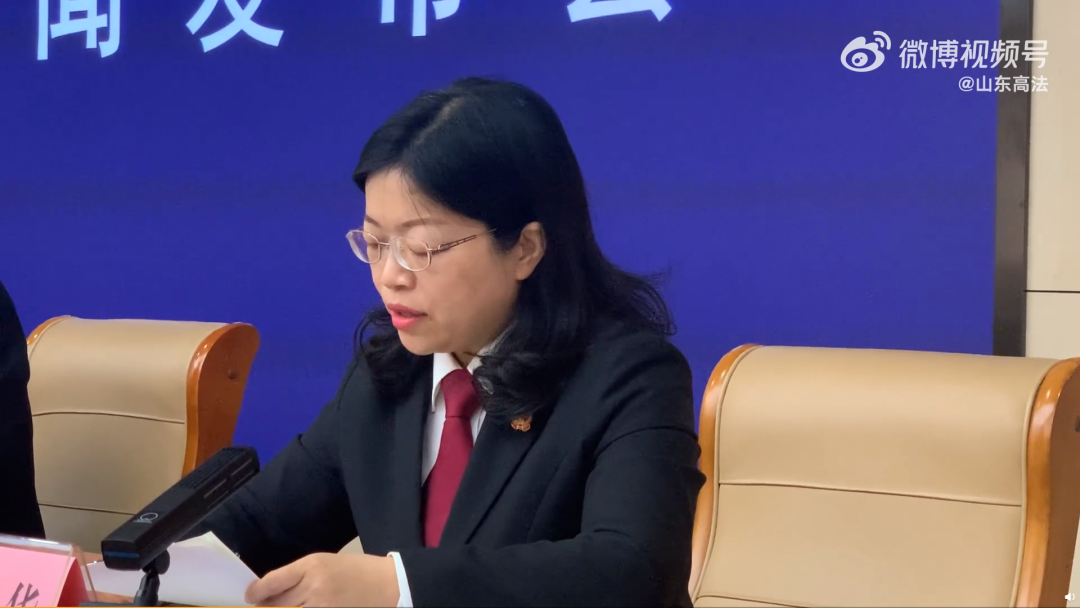
山东高院知识产权审判庭庭长刘晓华发布《2021年山东法院十大知识产权案件》。(来源:山东高法微博)
2021年山东法院十大知识产权案件
目 录
一、“德瑞特79”植物新品种侵权案
二、“混凝土搅拌拖泵”实用新型专利侵权案
三、“气体喷淋装置”实用新型专利权属纠纷案
四、“万象城”商标侵权案
五、“大众点评”不正当竞争案
六、“饿了么”诉“美团”不正当竞争案
七、“玉楼春”电视剧诉前行为保全案
八、“美可辛”商标侵权及不正当竞争案
九、“脱硫用塑化装置”专利侵权行政裁决案
十、史某、梁某、刘某侵犯商业秘密罪案
案例一、“德瑞特79”植物新品种侵权案
原告:寿光德瑞特种业有限公司(简称德瑞特公司)
被告:山东博盛种业有限公司(简称博盛公司)、汤某
【案情摘要】
德瑞特公司系黄瓜“德瑞特79”的植物新品种权人。德瑞特公司从汤某处购买了由博盛公司生产的“博盛99”黄瓜种子,并委托检测公司进行了DNA谱带数据对比鉴定,结论为“博盛99”与“德瑞特79”黄瓜种子差异位点数为0,判定为疑同品种。德瑞特公司认为博盛公司、汤某生产销售“博盛99”黄瓜种子的行为侵害了其植物新品种权,请求法院判令博盛公司、汤某停止侵权并赔偿经济损失。
法院经审理认为,德瑞特公司的检测鉴定系单方委托,其检测过程和检验方法缺乏公正性和权威性。法院依法委托农业农村部植物新品种测试中心进行了植物品种田间对比鉴定,对比结果为经1个生长周期2点测试,测试样品和对比样品在49个测试性状(《黄瓜测试指南》中共有50个基本性状)中有0个性状有明显差异;测试样品与对比样品无明显差异。因博盛公司不能证明两者之间存在明显差异,故应认定两者为同一品种。法院判决博盛公司、汤某停止侵权,博盛公司赔偿经济损失39.2万元。
【典型意义】
本案系根据检测鉴定意见转移举证责任,降低品种权人证明难度的典型案件。本案中虽然对50个基本性状中的性状35“果实:表面斑块分布”未予测试,但其余49个性状经测试未发现有明显差异。在此情形下,法院认定权利人已完成初步举证责任,适时转移举证责任,由被告对测试样品和对比样品在性状35存在差异点这一事实承担举证责任,并在被告举证不能的情况下,判令其承担不利后果。本案的裁判,准确把握接近阈值的侵权认定标准,加大植物新品种权司法保护力度,合理分配举证责任,对破解“举证难”问题进行了有益探索。本案入选“人民法院种业知识产权司法保护典型案例(第二批)”。
【合议庭成员】
一审法院审判人员:法官刘军生、法官李现光、法官吴峰,书记员许英琪。
二审法院审判人员:法官罗霞、法官潘才敏、法官邓卓,法官助理郑大地,书记员李思倩。
案例二、“混凝土搅拌拖泵”实用新型专利侵权案
原告:青岛青科重工有限公司(简称青科公司)
被告:青岛晨源机械设备有限公司(简称晨源公司)
【案情摘要】
青科公司系“一种具有导轨的混凝土搅拌拖泵”实用新型专利权人。青科公司认为晨源公司制造、销售、许诺销售混凝土搅拌拖泵的行为侵害其专利权,请求法院判令晨源公司停止侵权并赔偿经济损失10万元。
法院经审理认为,被诉侵权产品包含涉案专利全部技术特征,落入涉案专利权保护范围。晨源公司在其网站展示被诉侵权产品的行为构成许诺销售,侵害了青科公司的涉案专利权。法院判决晨源公司停止侵权并赔偿经济损失。
【典型意义】
本案系因许诺销售行为承担损害赔偿责任的典型案件。许诺销售行为侵权民事责任的承担不以销售实际发生为前提。许诺销售行为一经发生,即可能造成影响专利产品合理定价、减少或者延迟专利权利人商业机会等损害,因此,许诺销售行为实施者不仅应当承担停止侵害、支付维权合理开支的民事责任,还应当承担损害赔偿责任。侵权人仅实施了许诺销售行为,专利权利人难以举证证明其因此遭受的具体损失的,可以基于具体案情,着重考虑在案证据反映的侵权情节等,以法定赔偿方式计算损害赔偿数额。本案的裁判,明确了许诺销售行为人亦应承担损害赔偿责任,彰显了坚决依法惩处各类侵权违法行为、全面加强专利权保护的司法导向。本案入选“最高人民法院知识产权法庭裁判要旨(2021)”。
【合议庭成员】
一审法院审判人员:法官郭静、人民陪审员王文积、人民陪审员王国际,法官助理姜杨,书记员殷圣芳、孔帅。
二审法院审判人员:法官罗霞、法官周平、法官潘才敏,法官助理徐世超,书记员胡子璇。
案例三、“气体喷淋装置”实用新型专利权属纠纷案
原告:航天长征化学工程股份有限公司(简称航天长征公司)
被告:聊城市鲁西化工工程设计有限责任公司(简称聊城鲁西公司)
【案情摘要】
2009年,聊城鲁西公司的股东鲁西化工集团股份有限公司通过与航天长征公司签署项目合作协议获取航天长征公司的“HT-L航天粉煤加压气化技术”及专有设备。2017年,聊城鲁西公司向国家知识产权局申请名称为“一种气化炉出口气体喷淋装置”的实用新型专利并获得授权,聊城鲁西公司认可专利技术来源于航天长征公司,但其主张专利技术具有实质性的改进。航天长征公司请求法院确认“一种气化炉出口气体喷淋装置”实用新型专利权属于航天长征公司。
法院经审理认为,涉案专利系聊城鲁西公司接触借鉴了航天长征公司技术图纸相关技术方案后取得,而聊城鲁西公司提交的证据并不能证明其对相关技术方案的实质性特点作出创造性贡献,法院判令涉案专利权属于航天长征公司。
【典型意义】
本案系合理分配举证责任,保护真实权利人合法权益的典型案件。原告以涉案专利系被告将原告的非公开技术方案申请专利为由,主张涉案专利权归其所有的,应当举证证明涉案专利来源于其在先完成的非公开技术方案,并且被告在涉案专利申请日前能够获知该技术方案;被告主张其对原告的技术方案进行了改进并据此享有涉案专利权的,至少应当证明或者合理说明涉案专利相对于原告的技术方案存在区别,且该区别构成涉案专利的实质性特点和进步。本案的裁判,明确了在非公开技术方案基础上确定专利权属的裁判规则及标准,依法支持企业通过科技创新提升核心竞争力,体现了知识产权司法保护在服务创新驱动发展中的积极作用。本案入选“最高人民法院知识产权法庭裁判要旨(2021)”。
【合议庭成员】
一审法院审判人员:法官刘军生、法官李现光、法官吴峰,书记员杜慧敏。
二审法院审判人员:法官周翔、法官张晓阳、法官崔宁,法官助理李庆瑾,书记员王燚。
案例四、“万象城”商标侵权案
原告:华润知识产权管理有限公司(简称华润知产公司)
被告:山东华都置业有限公司(简称华都公司)
【案情摘要】
华润知产公司系“華潤萬象城”“the miXc 萬象城”“万象城”等商标的普通许可使用人,并有权以其名义进行诉讼维权;“華潤萬象城”商标系华润(集团)有限公司(简称华润集团)于2008年注册;“the miXc 萬象城”“万象城”商标系华润(深圳)有限公司于2016年注册,在“the miXc 萬象城”“万象城”商标注册之前,华润集团旗下公司运营的“万象城”项目已经对上述商标大规模使用并进行宣传推广。华都公司在其开发的楼盘及宣传中使用了经祥隆企业集团有限公司(简称祥隆公司)授权使用的“祥隆万象城”注册商标;“祥隆万象城”商标系祥隆公司于2013年注册。华润知产公司认为“the miXc 萬象城”“万象城”商标在核准注册前已构成未注册驰名商标,华都公司使用“祥隆万象城”注册商标侵害了“the miXc 萬象城”“万象城”商标权,请求法院判令华都公司停止使用“祥隆万象城”注册商标及其他相关被诉标识并赔偿经济损失。
法院经审理认为,华都公司使用的“祥隆万象城”虽为注册商标,且注册时间早于“the miXc 萬象城”“万象城”商标时间,但“the miXc 萬象城”“万象城”商标在祥隆公司申请商标注册前,已在房地产行业具有极高的知名度和影响力,构成未注册驰名商标,祥隆公司作为房地产行业经营者,申请注册“祥隆万象城”商标,明显具有攀附涉案“the miXc 萬象城”“万象城”未注册驰名商标知名度的主观恶意,华都公司在涉案楼盘上使用“祥隆万象城”商标,容易使相关公众误认涉案楼盘项目与权利人“the miXc 萬象城”“万象城”的服务有特定联系,侵害了涉案“the miXc 萬象城”“万象城”商标权。法院判令华都公司停止侵权并赔偿经济损失307.2万元。
【典型意义】
本案系涉及未注册驰名商标保护的典型案件。注册商标的使用不能侵害他人的合法在先权利,擅自将他人的未注册驰名商标恶意申请注册为商标并在相同服务项目上使用,容易导致相关公众产生混淆误认,属于侵害他人未注册驰名商标的行为,应当承担停止使用注册商标等法律责任。本案的裁判,通过司法认定未注册驰名商标,科学界定了驰名商标的权利边界和保护范围,有效制止了恶意抢注并使用该抢注商标的行为,拓宽了企业品牌做大做强的法律空间。
【合议庭成员】
一审法院审判人员:法官郭静、人民陪审员辛凤英、人民陪审员牟敦荣,法官助理姜杨,书记员孔帅、国莹莹。
二审法院审判人员:法官刘晓华、法官柳维敏、法官张金柱,法官助理赵有芹,书记员刘霞。
案例五、“大众点评”不正当竞争案
原告:上海汉涛信息咨询有限公司(简称汉涛公司)
被告:青岛简易付网络技术有限公司等(简称简易付公司)
【案情摘要】
汉涛公司系“大众点评”平台经营者,“大众点评”平台是我国知名生活服务信息网络平台。简易付公司通过对“大众点评”平台上的特定商户刷单、刷好评等手段进行虚假商业宣传。汉涛公司认为简易付公司的行为构成不正当竞争,请求法院判令简易付公司停止不正当竞争行为并赔偿经济损失。
法院经审理认为,简易付公司以营利为目的组织刷手刷单炒信,提供针对汉涛公司“大众点评”平台的店铺点赞、上门好评、增加店铺访客量和浏览量等有偿服务,进行虚假好评、炒作信用等虚假宣传,造成“大众点评”平台相关数据不真实,影响了“大众点评”平台的信用评价体系,损害了汉涛公司的合法权益,构成不正当竞争。法院判令简易付公司停止不正当竞争行为并赔偿经济损失30万元。
【典型意义】
本案系涉及互联网平台商家“刷单炒信”的新类型不正当竞争案件。近年来,“点评”已经成为消费者初步了解、选择互联网平台商家的重要依据,不法经营者采用“刷单炒信”等方式进行虚假宣传,严重违反诚实信用原则和基本的商业道德,损害其他经营者以及消费者的合法权益。本案的裁判,对规范互联网平台经济竞争秩序,促使平台经营者在市场交易中诚实守信、遵守商业道德具有积极意义。
【合议庭成员】
一审法院审判人员:法官刘圣林、人民陪审员张君、人民陪审员王菊,法官助理王冠宇,书记员殷圣芳。
案例六、“饿了么”诉“美团”不正当竞争案
原告:拉扎斯网络科技(上海)有限公司等(简称拉扎斯公司)
被告:北京三快在线科技有限公司等(简称三快公司)
【案情摘要】
拉扎斯公司系“饿了么”平台经营者,三快公司系“美团外卖”平台经营者,两平台均为商户和消费者提供在线外卖、即时配送和餐饮供应链等业务。拉扎斯公司发现,如果商户入驻“美团外卖”后又入驻“饿了么”,“美团外卖”就要求该商户停止使用“饿了么”,否则就通过改变该商户配送范围、降低曝光率等方式强迫该商户使用“美团外卖”独家服务。拉扎斯公司认为三快公司的行为构成不正当竞争,请求法院判令三快公司停止不正当竞争行为并赔偿经济损失。
法院经审理认为,三快公司强迫平台商户使用“美团外卖”平台独家服务,使平台商户丧失在“饿了么”平台的交易机会,同时也使消费者丧失从多平台获得产品和服务的渠道及机会,致使“饿了么”平台损失商户及消费者等核心资源,提高了拉扎斯公司进入相关市场的竞争成本,扰乱了市场竞争秩序,构成不正当竞争。法院判决三快公司停止不正当竞争行为并赔偿经济损失100万元。
【典型意义】
本案系涉及互联网平台强制“二选一”的新类型不正当竞争案件。随着平台经济的飞速发展,有关平台的不正当竞争问题也随之而来,本案实质上系经营者滥用数据、算法、技术、资本优势以及平台规则的排除、限制竞争行为。本案的裁判,通过严惩互联网平台强制“二选一”等破坏公平竞争的行为,加强了对平台企业不正当竞争的司法规制,对防止资本无序扩张,切实保护消费者合法权益和社会公共利益,维护和促进市场公平竞争具有积极意义。
【合议庭成员】
一审法院审判人员:法官郭静、法官石利华、人民陪审员杨传菊,法官助理宋福顺,书记员赵青媛、许郑楠。
案例七、“玉楼春”电视剧诉前行为保全案
申请人:阿里巴巴(中国)网络技术有限公司青岛分公司(简称阿里巴巴公司)
申请人:北京优酷科技有限公司(简称优酷公司)
被申请人:上海宽娱数码科技有限公司(简称宽娱公司)
【案情摘要】
阿里巴巴公司及优酷公司经授权取得《玉楼春》电视剧的信息网络传播权。宽娱公司是“哔哩哔哩(Bilibili)”平台运营方。阿里巴巴公司、优酷公司发现,随着《玉楼春》电视剧上线及剧集更新,“哔哩哔哩(Bilibili)”平台出现大量相关视频,侵害其合法权益,故提出诉前行为保全申请,请求法院责令宽娱公司删除侵权视频,并采取有效措施过滤拦截未经授权的用户上传和传播侵权视频。
法院经审理认为,阿里巴巴公司、优酷公司涉案作品权利基础稳定,若不采取行为保全措施会使权利人合法权益受到难以弥补的损害,而采取行为保全措施并不会造成权利人与宽娱公司之间的利益失衡和对社会公共利益造成损害,并且权利人为其申请提供了符合法律规定的担保。法院裁定宽娱公司删除相关视频并采取有效措施过滤拦截用户上传相关视频。
【典型意义】
本案系涉及“长短视频平台之争”的诉前禁令典型案件。随着信息网络传播技术的飞速发展和人民群众精神文化需求的日益增长,短视频在各大网络平台日渐流行,由此引发的短视频制作传播者、短视频平台与影视作品权利人之间的纠纷也日益增多。本案的裁判,依法妥善运用诉前行为保全措施,加强知识产权侵权源头治理,及时有效阻遏侵权行为,防止损害扩大,切实降低维权成本,坚决不能让权利人赢了官司输了市场。
【合议庭成员】
一审法院审判人员:法官郭静、法官石利华、法官徐友仁,书记员赵青媛。
案例八、“美可辛”商标侵权及不正当竞争案
原告:美盛农资(北京)有限公司(简称美盛公司)
被告:津港美禾辛化肥(天津)有限公司等(简称美禾辛公司)
【案情摘要】
美盛公司经授权许可使用“美可辛”商标并有权以其名义进行诉讼维权。美盛公司及其关联公司生产的使用“美可辛”商标及其特有包装、装潢的肥料产品销售范围遍及全国大部分省市。美盛公司认为美禾辛公司生产、销售的肥料产品上使用“美禾辛”标识及近似包装、装潢,并将“美禾辛”文字作为企业字号使用,侵害其涉案商标权并构成不正当竞争,请求法院判令美禾辛公司停止侵权并赔偿经济损失及合理开支共计1030万元。
法院经审理认为,美禾辛公司的被诉侵权行为侵害涉案商标权并构成不正当竞争,应承担停止侵权及赔偿损失等民事责任。关于赔偿数额,美盛公司已经尽力举证,而美禾辛公司拒不提供证明其侵权获利的财务账簿资料,法院根据美禾辛公司网站宣传的侵权肥料年销售量、侵权肥料销售价格、侵权持续时间、上市公司公布的复合肥产品平均毛利润率等证据,经过精细计算确定侵权获利远超美盛公司主张的1000万元,美盛公司亦提交证据证明其因本案支出律师费30万元。法院判令美禾辛公司停止侵权并赔偿经济损失及合理开支共计1030万元。
【典型意义】
本案系精细计算赔偿数额、加大损害赔偿力度的典型案件。在权利人已经尽力举证,而侵权人无正当理由不提供其财务账簿等资料的情况下,法院可以根据权利人提交的相关证据及查明的侵权事实,准确分析认定侵权产品的单价、数量、利润等因素,精细计算侵权获利数额。本案的裁判,依法适用举证妨碍规则确定赔偿数额,适当减轻权利人举证负担,并且根据相关证据精细计算侵权获利,全额支持权利人诉请,实现了司法能动与司法谦抑的有机统一,对破解“举证难”“赔偿低”等问题也进行了有益探索。
【合议庭成员】
一审法院审判人员:法官戴永成、法官吕桂欣、人民陪审员张玲,书记员黄圣楠。
二审法院审判人员:法官柳维敏、法官于志涛、法官张金柱,法官助理陈庆亮,书记员闫旭冉。
案例九、“脱硫用塑化装置”专利侵权行政裁决案
原告:江苏金浦顺橡塑科技有限公司(简称金浦顺公司)
被告:日照市市场监督管理局(简称日照市监局)
第三人:山东东盛橡胶科技股份有限公司(简称东盛公司)
【案情摘要】
金浦顺公司系“一种废旧轮胎橡胶回收脱硫用塑化装置”实用新型专利权人。金浦顺公司认为东盛公司生产被诉侵权产品的行为侵害其专利权,请求日照市监局行政处理。日照市监局认为被诉侵权技术方案未落入涉案专利权保护范围,裁决驳回金浦顺公司的全部请求。金浦顺公司认为上述行政裁决认定被诉侵权产品“冷却外壳”与涉案专利“加热外壳”不构成等同不当,不服上述行政裁决,提起行政诉讼,请求法院判令日照市监局撤销涉案行政裁决并重新作出行政裁决。
法院经审理认为,涉案专利明确限定了“加热外壳”,且说明书具体实施例中亦记载“只要具有加热功能即可”,故该限定是明确的,被诉侵权产品“冷却外壳”与涉案专利“加热外壳”不构成等同,被诉技术方案未落入涉案专利权保护范围。法院判决驳回金浦顺公司的诉讼请求。
【典型意义】
本案系跨区域技术类知识产权行政典型案件。根据最高人民法院批复,青岛知识产权法庭跨区域管辖日照市辖区内技术类知识产权行政案件。本案的裁判,通过对行政行为实体标准的司法审查,肯定了行政执法行为的正当性,对支持行政机关依法履职,促进知识产权行政执法标准和司法裁判标准统一具有积极作用,对构建知识产权保护大格局,形成保护合力也具有积极意义。
【合议庭成员】
一审法院审判人员:法官纪晓昕、人民陪审员刘淑芳、人民陪审员姚蔚,法官助理姜杨,书记员王蕾、许郑楠、国媛媛。
案例十、史某、梁某、刘某侵犯商业秘密罪案
公诉机关:山东省青岛市城阳区人民检察院
被告人:史某、梁某、刘某
【案情摘要】
青岛新型建设机械有限公司(简称青岛新型公司)系“骨料配料机”“骨料暂存斗”等技术秘密权利人。梁某、刘某原系青岛新型公司技术人员,二人将上述技术秘密披露给青岛某机械公司使用并申请专利,造成技术秘密被公开。被告人史某为青岛某机械公司实际负责人,明知梁某、刘某提供的图纸和技术方案为青岛新型公司所有,仍在青岛某机械公司使用。经鉴定,涉案技术秘密市场价值为1010万元。
法院经审理认为,被告人史某、梁某、刘某的行为均构成侵犯商业秘密罪,判处史某有期徒刑三年六个月,并处罚金十万元;判处梁某有期徒刑三年六个月,并处罚金五万元;判处刘某有期徒刑二年六个月,并处罚金三万元。
【典型意义】
本案系因离职员工披露原任职企业技术秘密引发的侵犯商业秘密刑事案件。自山东省全面开展知识产权审判“三合一”工作以来,知识产权刑事审判在惩治和威慑犯罪中持续发力。本案的裁判,不但对犯罪分子在刑罚层面予以严惩,还在经济层面予以惩罚,充分发挥了知识产权刑事审判的惩治和威慑作用,同时对进一步促进知识产权司法标准统一也具有积极意义。
【合议庭成员】
一审法院审判人员:法官吴仲雷、人民陪审员杨洋、人民陪审员胡冬梅,法官助理王源冰,书记员贾贝贝。
二审法院审判人员:法官刘圣林、法官李英三、法官徐友仁,法官助理任秀秀,书记员王娉婷。

扫码添加知产小管家,备注姓名+单位
免费获取裁判文书合集
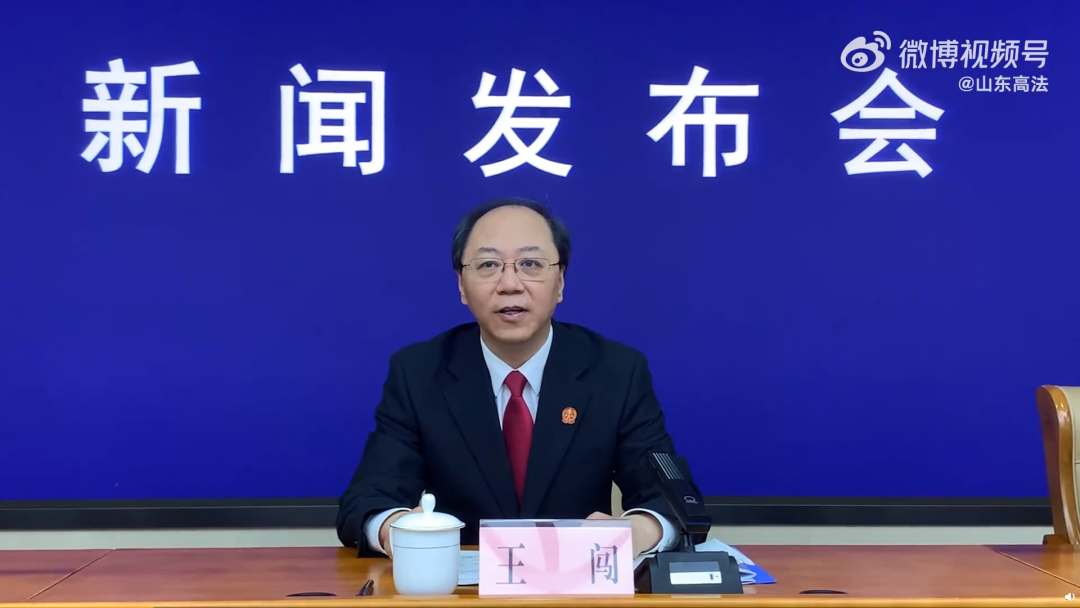
山东高院党组副书记、副院长王闯通报2021年山东法院知识产权司法保护状况。(图片来源:山东高法微博)
《2021年山东法院知识产权司法保护状况》
2021年,山东法院坚持以习近平新时代中国特色社会主义思想为指导,深入贯彻习近平法治思想,全面贯彻党的十九大和十九届历次全会精神,认真贯彻落实习近平总书记关于加强知识产权保护的系列重要讲话精神,紧紧围绕山东省知识产权保护大会确立的目标任务,锚定“走在前列、全面开创”“三个走在前”总遵循、总定位、总航标,立足新发展阶段、贯彻新发展理念、构建新发展格局、推动高质量发展,为全面开创新时代现代化强省建设提供了有力司法服务和保障。
一、依法公正高效审理各类案件,充分发挥知识产权审判职能作用
山东法院始终坚持以执法办案为第一要务,充分发挥知识产权审判激励创新创造、维护公平竞争、促进文化繁荣的重要作用,依法公正高效审理各类知识产权案件。
(一)收结案数保持持续增长
2021年,山东法院新收各类知识产权民事一审案件23275件,同比增长18%。其中,商标权案件7763件,同比增长23%;专利权案件1872件,同比增长21%;著作权案件11189件,同比增长11%;不正当竞争案件891件,同比增长138%;知识产权合同案件1382件,同比增长11%。共审结各类知识产权民事一审案件22558件,同比增长15%。收结案数均首次突破两万件。结案中,调解撤诉结案15598件,同比增长13%,调撤率达69%。

图1.2021年山东法院各类知识产权民事一审案件收结案示意图
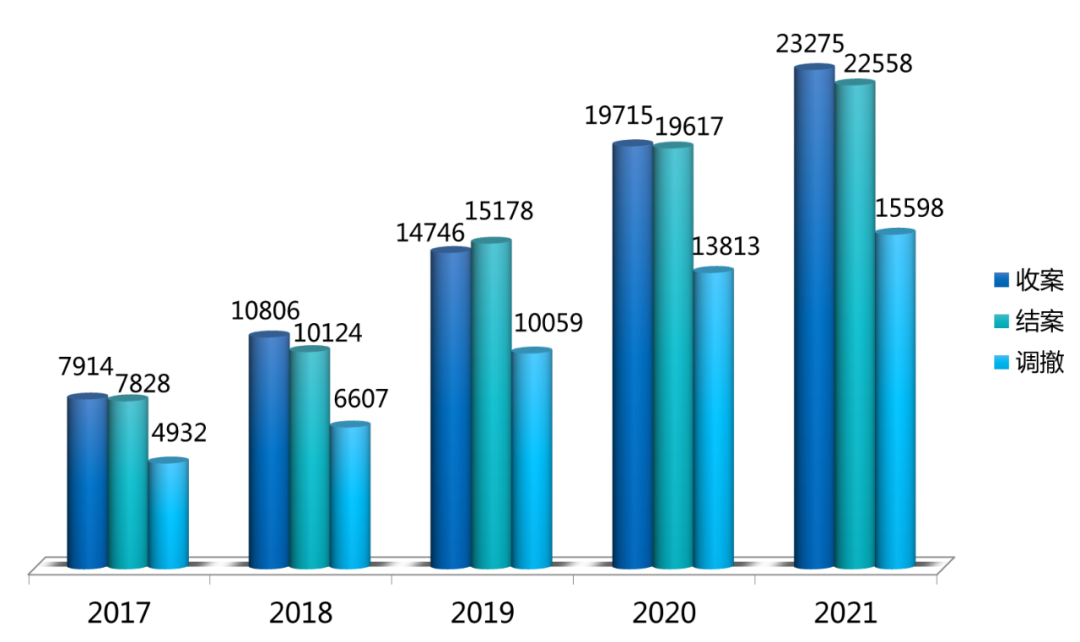
图2.山东法院近五年知识产权民事一审案件收结案示意图
2021年,山东法院新收各类知识产权民事二审案件2146件,同比增长22%。其中,商标权案件814件,同比增长38%;专利权案件166件,同比增长55%;著作权案件786件,同比增长13%;不正当竞争案件124件,同比增长5%;知识产权合同案件256件,同比增长11%。审结2093件,同比增长21%,其中,调解撤诉结案755件,同比增长20%,调撤率为36%。
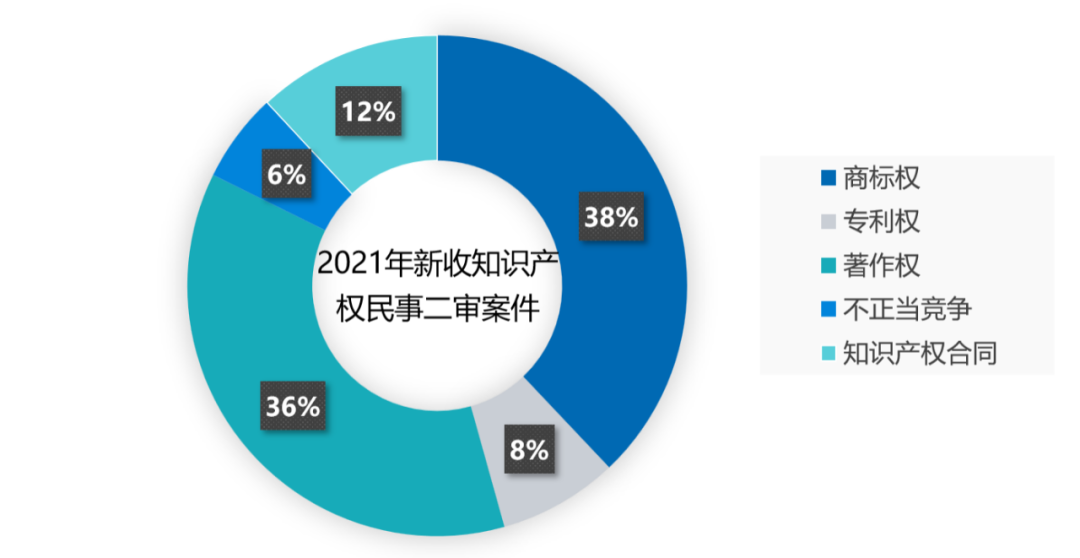
图3.2021年山东法院各类知识产权民事二审案件比例示意图
2021年,山东高院新收各类知识产权民事案件909件,审结867件。其中,新收一审案件2件;新收二审案件795件,审结767件;新收申请再审案件74件,审结62件;新收再审案件5件,审结5件;新收管辖案件33件,审结33件。
(二)审判职能作用充分发挥
山东法院紧扣推动高质量发展主题,围绕加快构建新发展格局,聚焦科技文化创新和产业发展,严厉打击各类知识产权侵权行为,不断提升保护产权和企业家合法权益的司法能力水平。
1.加强科技成果权保护,激励科技研发创新
山东法院加强对“卡脖子”关键核心技术、原始创新成果的保护,激励技术进步和产业升级,不断优化科技创新法治环境。2021年,山东法院共新收涉技术类知识产权民事一审案件1313件,审结1267件,同比分别增长33%、25%。其中,发明专利权案件164件,审结148件;实用新型专利权案件409件,审结455件;专利权权属案件36件,审结23件;计算机软件著作权案件154件,审结108件;技术合同案件425件,审结422件;技术秘密案件13件,审结15件;植物新品种权案件72件,审结59件;其他40件,审结37件。
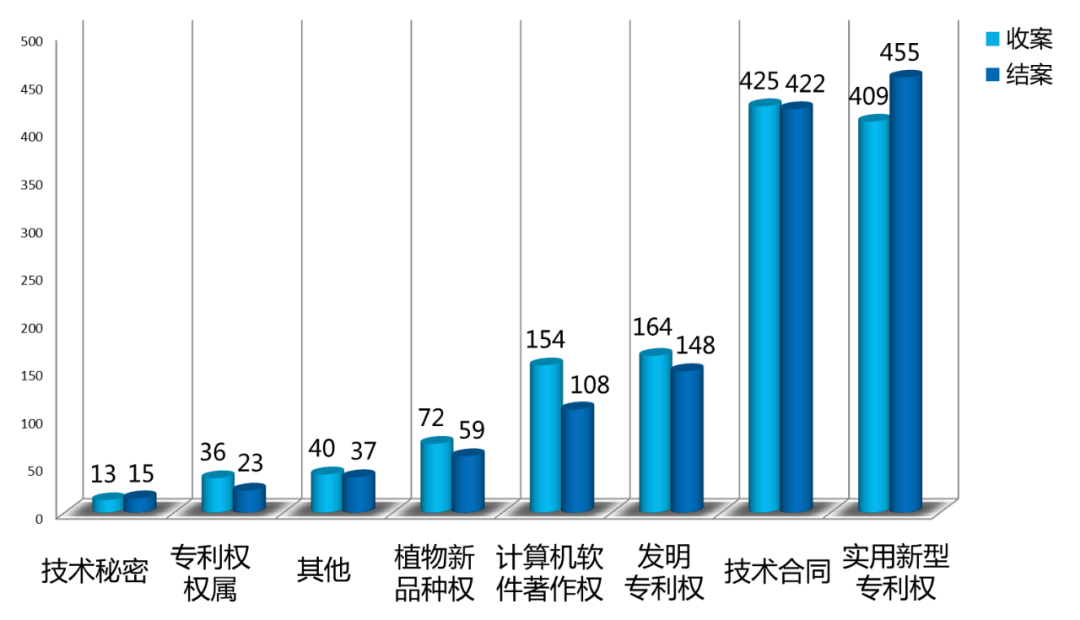
图4.2021年山东法院技术类民事一审案件收结案示意图
山东法院注重加强对新类型案件前沿法律问题研究,加大对新领域新业态核心技术保护。济南知识产权法庭审理的“路由器方法发明专利案”,系全国首例“网络通信领域实施方法专利侵权案”,该案件入选最高人民法院第28批第159号指导性案例;审理的“气体透过率测试仪侵害技术秘密纠纷案”对保密措施的认定,被最高人民法院作为2020年度技术类裁判规则予以推广;撰写的《权利要求书中的笔误应结合说明书、附图及本领域技术常识综合认定》入选“中国法院2021年度案例”。
山东法院加大对具有自主知识产权的重大农业科技成果和植物新品种的保护力度,维护我国种源种业安全,保障国家粮食安全战略和乡村振兴战略有效实施。全年共新收植物新品种权案件72件,同比增长700%,审结59件,同比增长436%,收结案均创历年来新高。济南知识产权法庭审理的“黄瓜德瑞特79侵害植物新品种权纠纷案”,准确把握接近阈值的侵权认定标准,适时转移举证责任,降低了品种权人证明难度,入选“人民法院种业知识产权司法保护典型案例(第二批)”。
2.加强商业标志保护,服务品牌强省建设
山东法院坚决制止商标攀附、仿冒搭车等行为,维护知名品牌市场价值,发挥知名品牌凝聚创新要素和整合创新资源的品牌效应,推动我省品牌强省战略目标实现。2021年,共新收涉青岛啤酒、潍柴、张裕、东阿阿胶、万象城、伊利、蒙牛、耐克、NBA等省内省外、国内国外知名商标侵权民事一审案件7763件,审结7726件,同比分别增长23%、26%。山东高院审理的“腾讯商标侵权及不正当竞争纠纷案”,在侵权人拒不提交完整账簿资料的情形下,依据权利人提交的证据,全额支持其2000万的赔偿请求,依法从重打击了假冒商标和字号的行为,该案被最高人民法院评选为“2020年中国法院50件典型知识产权案例”。审理的“喜力商标侵权及不正当竞争纠纷案”,转变行政程序当然优先或者必须前置的传统思维,对在后获得的外观设计专利权损害他人在先商标权利的,依法判令停止实施该外观设计专利,通过裁判依法规制了非正常专利申请的行为,该案入选“2020年中国十大最具研究价值知识产权裁判案例”。

图5.2021年山东法院商标权民事一审案件示意图
3.加强著作权保护,助推文化强省建设
山东法院积极应对数字化、网络化、智能化带来的著作权保护新问题,准确把握新科技环境下著作权司法标准,服务数字经济健康发展。2021年,共新收著作权侵权民事一审案件11189件,审结10786件,同比分别增长11%、7%。其中,侵害作品信息网络传播权案件5882件,审结5840件;侵害作品复制权、发行权案件3311件,审结3097件;侵害作品放映权案件1222件,审结1170件;其他774件,审结679件。山东高院在审理的“咪咕侵害作品信息网络传播权纠纷案”中,肯定了符合民事诉讼取证要求的第三方电子证据服务平台取证的证据效力,切实降低了权利人举证负担,为司法实践中举证难问题的解决提供了新技术的可行路径。该案被最高人民法院评选为“互联网十大典型案例”。

图6.2021年山东法院著作权民事一审案件示意图
4.规制不正当竞争行为,维护公平竞争秩序
山东法院依法公正高效审理各类反不正当竞争案件,严惩强制“二选一”“刷单炒信”等不正当竞争行为,切实保护市场主体和消费者合法权益,维护和促进市场公平竞争秩序。2021年,新收涉不正当竞争民事一审案件891件,审结821件,同比分别增长138%、140%。其中,商品名称、包装装潢案件252件,审结215件;企业名称案件155件,审结128件;仿冒案件122件,审结81件。青岛知识产权法庭审理的“饿了么诉美团二选一不正当竞争纠纷案”,严格执行涉平台垄断行为认定标准,对强制“二选一”说不,防止资本无序扩张,推动平台经济规范健康发展;审理的“大众点评不正当竞争纠纷案”,严厉打击了“刷单炒信”等扰乱经济秩序的不正当竞争行为,有力维护了互联网平台商家之间公平、公正、自由、诚信的竞争秩序。上述两案均被《人民法院报》《中国知识产权报》等媒体广泛报道。山东高院审理的“腾讯商业诋毁纠纷案”,在准确把握商业诋毁构成要件的基础上,对被控侵权人的行为是否构成商业诋毁作出了正确的定性,有力促进了互联网行业的规范化、法治化发展,该案裁判文书被评为第四届全国法院“百篇优秀裁判文书”。

图7.2021年山东法院不正当竞争民事一审案件示意图
5.加强平等保护,打造争端解决“优选地”
山东法院紧紧围绕党和国家发展大局,始终坚持平等保护原则,维护权利人合法权益,努力营造良好国际营商环境。2021年,山东法院新收涉外及涉港澳台知识产权民事一审案件863件,审结968件,分别占总案件数的3.7%和4.3%。其中,涉外商标权案件477件,审结527件,占比分别为55%和54%;涉外著作权案件363件,审结415件,占比分别为42%和43%。在涉外商标侵权案件中,涉香奈儿、普拉达、耐克、阿迪达斯、李维斯、路易威登、轩尼诗等国际知名品牌,涉服装、香水、酒类、化肥等多种商品。除国外主体维权外,也出现了高平市垚谊商贸有限公司等国内主体起诉美国网件公司等外国主体侵害发明专利权纠纷案件。山东高院审理的“美可辛商标侵权及不正当竞争纠纷案”,在权利人已经尽力举证而侵权人拒不提供其财务账簿资料的情况下,根据侵权人全方位攀附权利人商誉实施长期侵权的事实,全额支持了权利人1030万元的赔偿诉求,有力打击了侵权行为,全面保护了权利人的合法权利。青岛知识产权法庭审理的“先正达商标侵权及不正当竞争纠纷案”,注重加大对全球知名、世界领先农业跨国集团保护力度,严惩侵权源头,有力维护了涉农资产品的市场竞争秩序。
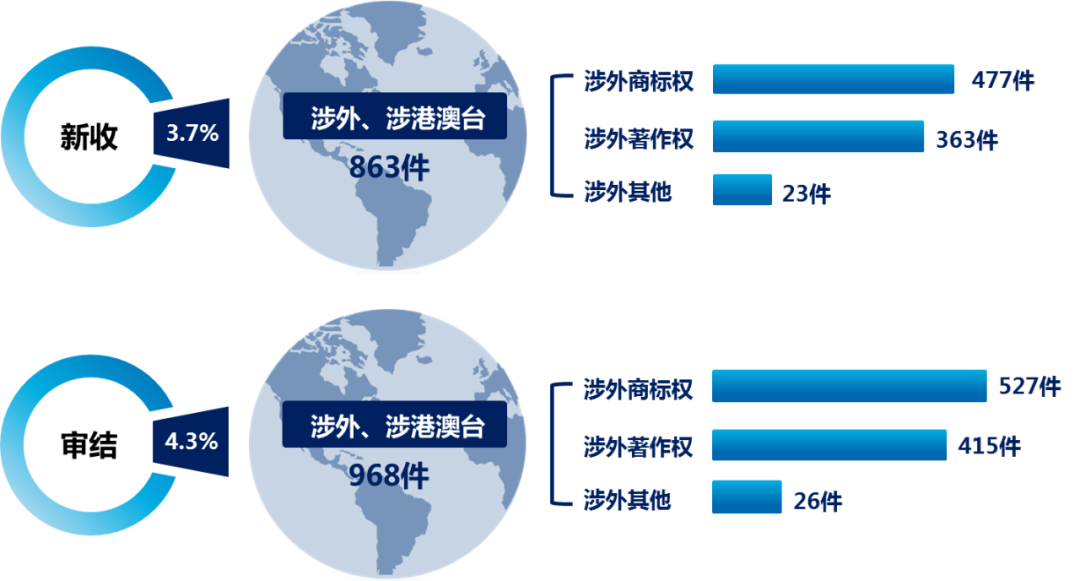
图8.2021年山东法院涉外知识产权民事一审案件示意图
二、提升知识产权司法保护整体效能,着力营造有利于创新创造的法治环境
山东法院立足知识产权审判实际,加强与行政职能部门协同配合,拓展纠纷多元化解渠道,强化司法公开,不断加大损害赔偿力度,切实提升持续深入优化营商环境的司法能力水平。
(一)举办知识产权专业化审判二十周年庆祝活动,有效提升司法保护影响力
2021年是山东法院知识产权专业化审判二十周年。二十年来,山东法院知识产权受理案件数量飞跃增长,由2001年的186件增长为2021年的23555件;保护领域不断拓宽,已覆盖全部案件类型,涉及知识产权创造、运用、保护、管理、服务的全过程;管辖布局逐步优化,形成了由山东高院、两知识产权法庭、其他各中院以及21个基层法院管辖的布局;保护水平不断提高,共4起案例入选最高人民法院指导性案例,15起案件入选《最高人民法院公报》《最高人民法院知识产权案件年度报告》,40起案件入选最高人民法院“中国法院十大知识产权案件”“50件典型案例”。2021年,最高人民法院党组书记、院长周强同志在视察山东工作时,对山东法院知识产权司法保护工作予以充分肯定。最高人民法院党组副书记、常务副院长贺荣同志对山东法院知识产权司法保护工作给予充分肯定并作出重要批示。全国人大常委会委员、全国人大监察和司法委员会副主任委员徐显明率调研组专题到山东法院调研知识产权审判工作情况并给予高度评价。
为讲好山东故事,打造山东名片,带动全社会形成创新发展的浓厚氛围,山东高院开展知识产权专业化审判二十周年庆祝活动。召开新闻发布会发布《山东法院知识产权司法保护状况(2001-2021)》中英文版和《山东法院知识产权典型案例选(2001-2021)》,制作《二十年 正青春——奋进中的山东知识产权审判》专题宣传片,开展知识产权优秀裁判文书和优秀调研成果评选,表彰知识产权审判工作先进集体与先进个人。上述活动被新华社、大众日报等中央、地方主流媒体广泛报道,取得良好效果。通过上述活动的开展,既总结二十年来山东省知识产权司法保护的宝贵经验,又查找问题、补齐短板、展望未来,同时也扩大山东省知识产权司法保护影响力,以司法裁判引领社会风尚,积极营造尊法学法守法用法的良好氛围。
(二)健全保护衔接机制,强化知识产权全链条保护
山东法院建立健全与市场监管、知识产权、文化管理部门常态化、制度化的协作机制,在信息共享、问题研讨、纠纷多元化解等方面协同配合,构建司法保护、行政支持、社会协作的大保护工作格局。山东高院与省市场监督管理局就加强知识产权保护举行交流座谈,联合签署并发布《知识产权司法保护与行政执法衔接合作框架协议》。济南中院加强与公安、检察、市场监管等部门沟通对接,先后与市市场监督管理局及省国家知识产权保护中心签订协议,合力惩治知识产权侵权行为。青岛中院与市市场监督管理局召开知识产权司法行政一体化保护座谈会,探讨知识产权司法行政一体化保护新模式。枣庄、济宁中院与徐州、淮北等十中院共同制定、签署了《淮海经济区知识产权司法保护工作框架协议》,并联合发布淮海地区知识产权审判司法保护典型案例。潍坊中院与市司法局、文旅局共同出台《著作权纠纷“三调一诉”实施办法》,实现了司法、行政的优势互补,着力打造著作权的全链条保护。淄博、烟台、滨州、德州中院分别与行政机关联合签署协同保护协议或建立联动机制,合力惩治知识产权侵权行为,形成知识产权保护合力。德州市德城区法院、聊城市临清法院分别与区检察院、公安局、司法局、市场监督管理局等相关单位建立知识产权保护联席会议制度,实现知识产权非诉解纷、行政执法和司法保护的协同推进。
(三)完善多元解纷机制,全力推进矛盾纠纷诉前化解
山东法院坚持把非诉纠纷解决机制挺在前面,健全与相关行政部门、人民团体、维权中心、行业协会、商会等的调解联动工作机制,完善诉调对接、调解仲裁对接、行政执法与调解对接以及多部门会商协作的工作制度,全力推进诉前化解矛盾纠纷。青岛知识产权法庭先后赴各跨域地区为人民调解员专题授课,委托调解,不断提升跨区域知识产权多元纠纷化解水平。烟台中院与市市场监督管理局签订《关于知识产权行政与司法一体化保护机制框架协议》,组建烟台市知识产权纠纷调解中心,完善全社会、多渠道知识产权纠纷化解机制。潍坊中院与市仲裁委签订《关于进一步提升仲裁案件保全、执行和司法审查质效的意见》,推动设立仲裁综合服务窗口,强化联络机制,促进纠纷多元化解。威海中院现场指导多名调解员进行调解,当场促成28起纠纷达成调解协议,并就知识产权纠纷的调解技巧方法对全体调解员进行业务培训。滨州中院与市市场监督管理局联合发布《关于建立知识产权纠纷诉调对接机制的实施意见》,推动知识产权纠纷多元化解机制建设,2021年诉前调结案720件,占比64%。德州中院与市市场监督管理局签署《关于开展知识产权纠纷诉调对接工作的实施意见》,并联合设立“知识产权保护诉调对接工作室”。德州市德城区法院将知识产权专业审判团队、法院速裁调解中心、社会知识产权维权协会(专业知识产权调解委员会)三合一,宁津县(健身器材和家具)快速维权中心的特邀调解员、市场监督管理局知识产权调解中心纷纷入驻德城区法院调解平台,迅速打开调解工作新局面。
(四)强化司法公开力度,有序推进司法宣传常态化
山东法院连续20年组织开展“4.26世界知识产权日”宣传活动。山东高院召开新闻发布会发布了《山东法院知识产权司法保护状况(2020年)》和《2020年山东法院十大知识产权案件》;组织召开人大代表座谈会,听取人大代表对山东法院知识产权审判工作的意见和建议。各中院召开新闻发布会发布司法保护白皮书。滨州中院做客滨州电视台《道德法治》直播间,向广大市民讲解知识产权保护的相关知识;通过《知识产权小剧场》播出相关短视频,用轻松活泼的形式讲解知识产权法律知识,提高公众知识产权保护意识。聊城中院在聊城市民文化活动中心广场举办侵权实物展,提高群众对侵权商品的辨别能力。
(五)落实惩罚性赔偿制度,切实发挥司法惩治威慑力
根据山东省委、省政府关于全省深化“放管服”改革优化营商环境重点任务分工要求,山东高院知识产权审判庭联合山东省知识产权研究院、烟台大学法学院对知识产权惩罚性赔偿相关疑难问题进行研讨,并在广泛调研的基础上,形成《知识产权惩罚性赔偿制度研究报告》,制定《山东省高级人民法院关于审理侵害知识产权民事案件适用惩罚性赔偿的裁判指引》,细化知识产权惩罚性赔偿标准,把惩罚性赔偿制度落到实处,圆满完成所分工负责的优化营商环境重点任务。在万家民营企业评营商环境报告中,山东省司法指标得分居全国第1位,知识产权司法保护作出了应有的贡献。为准确适用知识产权惩罚性赔偿制度,依法惩处侵害知识产权行为,淄博中院制定《关于知识产权民事侵权案件适用惩罚性赔偿的指导意见》、东营中院制定《关于推进知识产权民事侵权纠纷适用惩罚性赔偿的意见》、日照中院制定《关于知识产权民事侵权纠纷适用惩罚性赔偿裁判规则》、滨州中院制定《关于知识产权民事侵权纠纷适用惩罚性赔偿意见(试行)》,落实惩罚性赔偿制度。
(六)深化司法交流合作,展现司法保护良好形象
山东高院应邀参加第二届跨国公司领导人青岛峰会,在举办的跨国公司知识产权保护与合作论坛上,就“山东省知识产权司法保护状况”进行了详细介绍;与山东法学会、山东大学法学院就知识产权案件“禁诉令”适用问题进行研讨座谈;与中国音像著作权集体管理协会进行座谈,就KTV经营者侵权及赔偿问题进行了沟通交流。青岛中院与市律协共同举办前沿问题研讨会,参加自贸区“RCEP协定下企业知识产权合规指引”研讨会、“4.26青岛知识产权论坛”等学术活动并做主题发言,不断提升“青知”品牌影响力。潍坊中院应邀为市市场监督管理局、市知识产权保护中心举办的“全市知识产权保护及纠纷调解能力提升培训班”授课,对行政执法实践中的疑难复杂问题进行针对性辅导。威海中院参加市知识产权人民调解委员会年度工作会议及市知识产权诉调、诉裁对接协调会,对人民调解员的调解工作进行了业务指导。
三、深化知识产权审判领域改革创新,推进知识产权审判体系和审判能力现代化
山东法院强化四级法院审级职能定位,深化知识产权审判体制机制改革,健全完善各项工作机制,不断提升深化改革创新的司法能力水平。
(一)持续推进“三合一”机制改革
山东高院与山东省检察院就开展知识产权审判“三合一”工作举行多次座谈,联合签署并发布《知识产权审判与检察职能衔接合作框架协议》,共同协助推进知识产权“三合一”工作。山东高院制定《山东省高级人民法院关于全面推进知识产权审判“三合一”工作的实施方案》并下发全省执行,全面推动山东法院知识产权审判“三合一”工作有序开展。目前,山东高院、全省17个中级法院、济南市历下区等21个基层法院均已开展知识产权审判“三合一”工作,山东法院知识产权司法保护体制机制进一步完善。青岛中院与市检察院共同召开知识产权“三合一”工作推进会,签订《知识产权审判与检察职能衔接合作框架协议》,建立完善案件管辖制度和协调机制。烟台、滨州、德州、聊城中院均联合当地检察机关、公安机关共同发布或会签合作框架协议等文件,全面加强在打击侵犯知识产权刑事犯罪工作中的协调配合,进一步提升知识产权司法保护力度;烟台、威海、聊城中院还出台具体实施方案、调整管辖的通知等文件,推进知识产权审判“三合一”工作落地落实。2021年,山东法院新收知识产权行政一审案件24件,同比增长50%,审结17件;新收知识产权刑事一审案件256件,审结232件。青岛知识产权法庭审理的“青岛云路公司技术秘密侵权案”,在刑事制裁之后,判决民事赔偿500万元,全面打击了侵权行为,凸显了知识产权审判“三合一”机制对权利保护的优势作用。
(二)大力加强知识产权法庭建设
自2017年设立济南、青岛知识产权法庭以来,山东高院持续强化两法庭建设。2021年3月,山东高院专题召开济南、青岛知识产权法庭座谈会,从提高政治站位、胸怀国之大者,服务大局、激励保障创新,完善布局、创新制度机制,打造品牌、实施精品战略,加大赔偿、实施最严格保护,培养人才、打造一流队伍等六个方面对进一步加强两法庭建设作了安排部署。两法庭积极推动建立跨区域知识产权司法协作机制,分别与辖区内相关中院签订工作协议,建立协作平台。济南知识产权法庭在原有菏泽及济南市中、长清3处巡回审判庭的基础上,增设淄博、聊城及济南自贸区巡回审判庭,青岛知识产权法庭已实现技术类知识产权案件辖区巡回审判庭全覆盖,技术类知识产权审判体制机制进一步优化。两法庭对全省知识产权审判的龙头带动效果明显。2021年,济南知识产权法庭新收各类知识产权案件1902件,结案1946件;其中,新收跨区域知识产权民事一审案件1423件,结案1285件。青岛知识产权法庭新收各类知识产权案件1696件,结案1497件;其中,新收跨区域知识产权民事一审案件858件,结案757件。
(三)健全技术事实查明机制
山东法院构建技术调查官、技术咨询专家、技术鉴定人员、专家辅助人参与诉讼活动的技术事实查明机制,有效提升知识产权纠纷案件技术事实的认定水平。济南中院出台《技术调查官管理实施细则(试行)》,建立技术专家库,在原有聘请38名全国知名专家作为咨询专家的基础上,聘任24名技术专家作为知识产权审判技术调查官,全力构建济南特色的技术调查官运行机制。青岛中院在选聘40名技术咨询专家、22名兼职技术调查官的基础上,提请人大任命35名技术专家担任陪审员,深入参与案件庭审、现场勘验等诉讼活动,协助法官准确理解和高效查明案件的专业技术问题,最大限度发挥专家在技术事实查明中的作用。山东科技大学郭银景教授作为合议庭成员参与青岛知识产权法庭审理的“手机振膜实用新型专利侵权案”被各大媒体广泛予以报道。
(四)完善繁简分流诉讼机制
山东法院全面加强诉源治理,探索知识产权案件快速审理机制。济南知识产权法庭速裁团队收案1005件,结案1009件,分别占同期知识产权案件总量的53%、52%。济南市历下区法院适用知识产权小额诉讼程序以及著作权、商标权纠纷要素式审判模式,适用小额诉讼程序办结各类知识产权案件654件。威海中院及环翠区法院分别成立两个速裁团队,在2021年知识产权民事案件收案数量同比增长近1倍的情况下,平均办案周期压缩至2020年度的一半左右。
(五)强化智慧法院成果应用
山东法院充分运用智慧法院建设成果,依托全流程办案系统,实现网上立案、司法文书电子送达、及时裁决无缝衔接,缩短内部流转周期。山东高院大力推进互联网庭审,在431件开庭(调查)案件中,互联网审理案件325件,占75%。山东法院就技术类知识产权案件率先实现向最高人民法院案件电子化上诉移送。济南知识产权法庭依托智慧法院平台,积极推行全流程网上办案,全年通过互联网在线庭审114件,电子送达4523次。济宁中院辖区法院在线庭审340件,在线庭审率33%。日照中院在线庭审40件,音视频、电话、微信调解161次,电子送达294次。青岛知识产权法庭率先打造“智能3D证据管理系统”,运用3D扫描建模技术和区块链技术,通过三维扫描箱、手持扫描仪、空间扫描仪、无人机等对实物证据进行3D建模,形成高清三维展示模型,率先实现了与最高人民法院办案系统数字化证物无缝对接,法官及当事人可直接通过电子设备多角度、全方位查看证据细节,有效解决证据存储、移送等难题,《人民法院报》头版、最高人民法院智慧法院建设公众号专门予以报道。济南知识产权法庭也积极探索实施“智能3D证据管理模式”,全年共建模“智能3D证据”461件,并出台《知识产权审判“智能3D证据”管理规范(试行)》,全面推进信息技术与知识产权审判工作深度融合,上述经验做法被新华网宣传报道。为全面推进信息技术与知识产权审判工作深度融合,山东高院现正在全省大力推广,已有多地法院逐步启动此项工作。
四、加大知识产权审判调研指导力度,积极服务经济社会高质量发展大局
山东法院加强审判热点难点问题研究,通过多种方式加强监督指导,强化裁判规则指引,不断提升服务工作大局的司法能力水平。
(一)强化审判指导,统一裁判标准
山东高院年初制定下发了《2021年知识产权审判工作要点》,对全年工作作出统筹安排;完成《山东法院2020年二审知识产权案件改发情况及典型案件分析报告》,总结分析了山东法院一审案件审理中存在的问题,明确了相关裁判规则;就销售商侵权赔偿数额、省内KTV经营者侵权赔偿和知识产权案件管辖等相关问题统一了裁判标准;通过《知识产权审判要情》季刊、全省知识产权法官微信群及时推送知识产权司法保护经验做法和典型案例,不断拓宽审判指导渠道。为推进知识产权审判“三合一”工作走深走实,山东高院完成《山东法院关于开展知识产权刑事案件法律适用问题的调研报告》;省社科调研课题《知识产权惩罚性赔偿的法律适用研究》结项。东营中院对地理标志证明商标保护工作开展调查研究并形成了调研报告,为进一步提高地方特产的市场知名度提供司法服务。
(二)制定规范意见,精准服务大局
济南中院精准对接省会新旧动能转换起步区、自由贸易试验区建设等重大部署,制定《关于全面加强知识产权司法保护促进创新发展的意见》,积极延伸知识产权司法保护职能,全力服务保障经济社会创新发展。滨州中院出台《关于加强知识产权司法保护、推进法治化营商环境建设的实施意见》,加大对知识产权的保护力度,提高公众知识产权保护意识。德州中院制定《关于充分发挥审判职能依法保障和促进科技创新的意见》,获得市委领导肯定和高度评价。
(三)延伸司法服务,保障创新发展
山东高院就《山东省2021-2022年知识产权保护推进计划》《山东省知识产权促进与保护条例》等多个省委部署文件提出建议和意见,向省市场监督管理局报送山东法院知识产权司法案件情况统计,向省知识产权局报送《山东法院2021年打击侵犯知识产权和制售假冒伪劣商品工作总结》,为推动山东高质量发展贡献司法智慧。就《最高人民法院关于适用中华人民共和国反不正当竞争法若干问题的解释》等若干司法解释征求意见稿提出修改建议。济南知识产权法庭举办“知识产权大讲堂”,免费向社会公众进行线上培训。青岛中院与市民营经济局合作,先后在线举办“服务民营中小企业知识产权保护”“中小企业服务月·我为企业办实事——知识产权赋能企业发展”等专题讲座,线上线下累计受众15000余人;携手山东大学法学院开展“法律近距离”之知识产权庭审进校园活动。淄博中院借助便民网格平台与科技法庭办公系统,在企业园区设立知产审判工作室。烟台中院为烟台大学法学院学生授课,担任烟台大学法学院研究生论文答辩评委等。
五、始终坚持知识产权审判正确方向,努力打造素质优良的专业化审判队伍
山东法院推进党史学习教育和队伍教育整顿走深走实,努力锻造一支政治坚定、顾全大局、精通法律、熟悉技术并具有国际视野的知识产权审判队伍。
(一)坚持党建引领,加强政治建设
山东法院坚持以党建带队建促审判,加强政治建设,筑牢政治忠诚。深入学习贯彻习近平总书记“七一”重要讲话精神、党的十九届六中全会精神,不断提高政治站位、坚定理想信念。始终坚持党对司法工作的绝对领导,坚定不移走中国特色社会主义法治道路,深入领悟“两个确立”的决定性意义,增强“四个意识”,坚定“四个自信”,做到“两个维护”。山东高院联合山东大学法学院、省法学会研究部党支部开展党史学习主题党日活动,推进党建和审判工作的深度融合,实现以党建带队建促审判的良好效果;开展“筑忠诚、作表率”等主题党日活动,树立大局意识和集体观念,形成坚决反对“两面人”“自黑”的集体氛围。青岛中院开展“院士港主题党日”“庆祝祖国华诞及法庭成立四周年主题党日”等活动,激励干警以百年党史坚定理想信念,增强党性修养。
(二)加强学习教育,打造政法铁军
山东法院扎实开展党史学习教育和政法队伍教育整顿活动,切实把开展党史学习教育作为践行“两个维护”的生动实践,不断提高政治站位、坚定理想信念。山东高院组织干警参加“致敬巾帼英雄,传承红色基因”故事会、党史学习心得分享会、“使命呼唤担当”党性教育学习培训活动,提升党史学习教育成效和党性修养。山东法院积极开展“我为群众办实事”活动,山东高院先后走进烟台荣昌制药股份有限公司、万华化学集团股份有限公司,就企业在知识产权保护方面遇到的问题进行座谈交流。济南、烟台、威海、泰安、聊城、菏泽中院积极送法进企业,为企业提供“零距离”法律服务,助推企业创新发展,切实解决人民群众“急难愁盼”问题。青岛中院加强审判队伍专业化建设及青年干部队伍建设,成立中院“知识产权创新服务队”,积极打造全国知识产权审判领域专业品牌。
2022年是我国进入全面建设社会主义现代化国家、向第二个百年奋斗目标进军新征程的重要一年,也是山东新旧动能转换“五年取得突破”的决战之年。山东法院将紧密团结在以习近平同志为核心的党中央周围,以习近平新时代中国特色社会主义思想为指导,全面落实山东省2022年工作动员大会提出的“十大创新”重点任务,始终把创新摆在发展全局的核心位置,进一步加大知识产权司法保护力度,努力为新时代社会主义现代化强省建设提供更加有力的司法服务和保障,以优异成绩迎接党的二十大胜利召开。
山东省高级人民法院
2022年4月21日
《Intellectual Property Protection by Shandong Courts in 2021》
In 2021, Guided by Xi Jinping Thought on Socialism with Chinese Characteristics for a New Era, Shandong courts strictly adhered to the guidance of Xi Jinping Thought on the Rule of Law, comprehensively implemented the guiding principles of the Party’s 19th National Congress and all plenary sessions of the 19th Party Central Committee, and earnestly carried out the spirit of General Secretary Xi Jinping’s series of important speeches on strengthening intellectual property right protection. By closely focusing on the goals and tasks established at the Shandong Intellectual Property Right Protection Conference, aiming at the general compliance, positioning, and orientation toward “being the spearhead and making advances on all fronts” and “three in the forefront” concepts, Shandong courts dedicated significant effort to ground work in this new stage of development, apply the new development philosophy, foster a new pattern of development, promote high-quality development, and provided powerful judicial services and guarantees for building a modern and powerful province in a new era.
I. Efficiently and Fairly Hearing Various Cases in accordance with the Law, and Giving Full Play to the Role of Intellectual Property Right Trials
Shandong courts always adhere to prioritizing law enforcement and case handling, give full play to the important role of intellectual property right trials in stimulating innovation and creativity, maintaining fair competition, and promoting cultural prosperity, and have tried various intellectual property right cases in a fair and efficient manner in accordance with the law.
(I) The total number of cases continued to increase
In 2021, Shandong courts newly accepted a total of 23,275 civil intellectual property cases of first-instance, up by 18% year-on-year. Among them, 7,763 trademark cases were accepted, up by 23% year-on-year; 1,872 patent cases, up by 21% year-on-year; 11,189 copyright cases, up by 11% year-on-year; 891 unfair competition cases, up by 138% year-on-year; and 1,382 intellectual property contract cases, up by 11% year-on-year. During the year, Shandong courts concluded a total of 22,558 intellectual property cases of first-instance, up by 15% year-on-year. The number of accepted and concluded cases exceeded 20,000 for the first time. Among the concluded cases, 15,598 cases were concluded through mediation or withdrawal, up by 13% year-on-year, and the rate of mediation and withdrawal reached 69%.
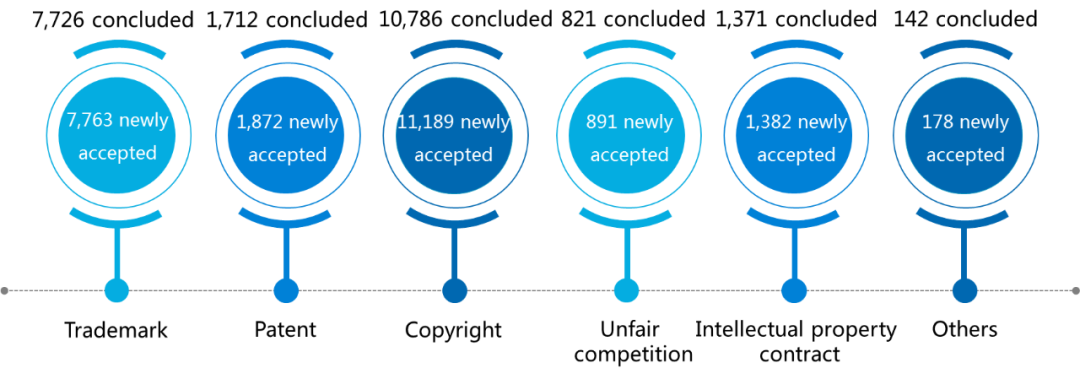
Fig. 1. Graph of number of civil intellectual property cases of first-instance accepted and concluded by Shandong courts in 2021
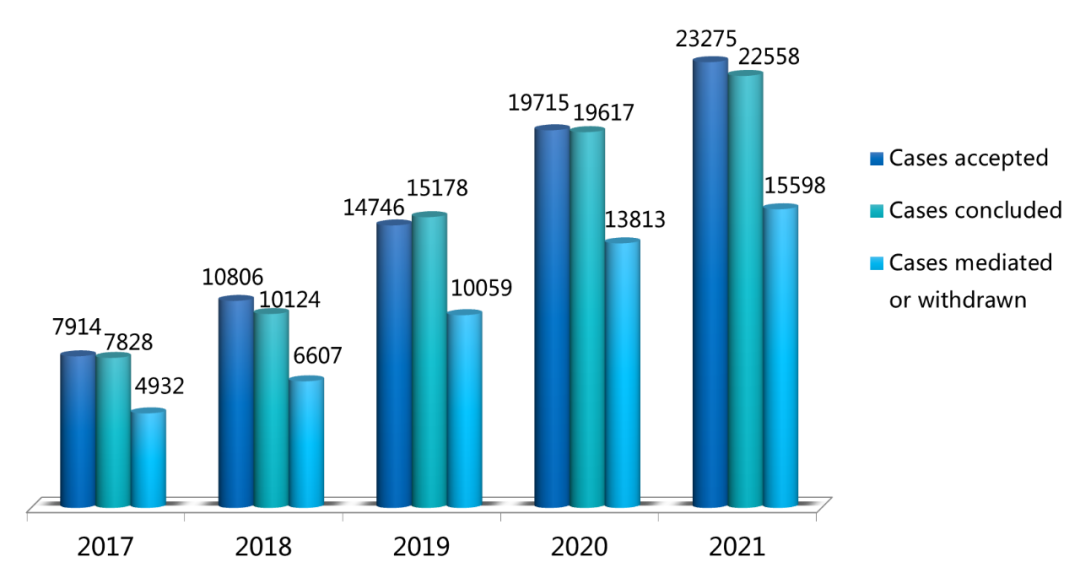
Fig. 2. Graph of civil intellectual property cases of first-instance accepted and concluded by Shandong courts in the past five years
In 2021, Shandong courts newly accepted 2,146 civil intellectual property cases of second-instance, up by 22% year-on-year. Among them, 814 trademark cases were accepted, up by 38% year-on-year; 166 patent cases, up by 55%; 786 copyright cases, up by 13%; 124 unfair competition cases, up by 5% year-on-year; and 256 intellectual property contract cases, up by 11% year-on-year. During the year, Shandong courts concluded 2,093 cases, up by 21% year-on-year, including 755 cases concluded through mediation or withdrawal, up by 20% year-on-year, and the rate of mediation and withdrawal reached 36%.
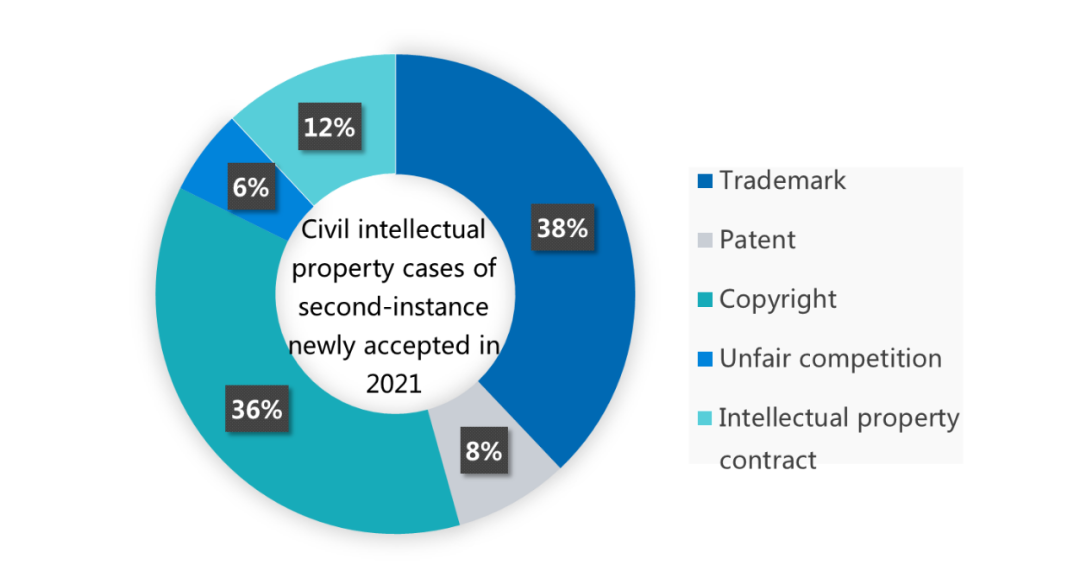
Fig. 3. Graph of civil intellectual property cases of second-instance newly accepted by Shandong courts in 2021
In 2021, the Shandong High People’s Court newly accepted 909 civil intellectual property right cases and concluded 867 cases, which included 2 newly accepted first-instance cases; 795 newly accepted second-instance cases, with 767 concluded; 74 newly accepted petitions for retrial, with 62 concluded; 5 newly accepted retrial cases, with 5 concluded; and 33 newly accepted jurisdiction cases, with 33 concluded.
(II) Giving full play to the role of intellectual property right cases trials
Shandong courts closely followed the theme of promoting high-quality development, accelerated the construction of a new development pattern, focused on technological and cultural innovation and industrial development, cracked down on various intellectual property infringements, and consistently improved the judicial capacity to protect property rights and the legitimate rights and interests of entrepreneurs.
1.Strengthening the protection of the ownership right of scientific and technological achievements and stimulating innovation in scientific and technological research and development
Shandong courts strengthened the protection of key and core technologies and original innovation achievements, stimulated technological progress and industrial upgrade, and consistently optimized the legal environment for scientific and technological innovation. In 2021, Shandong courts newly accepted a total of 1,313 civil technology-related intellectual property cases of first-instance, and concluded 1,267 cases, up by 33% and 25% year-on-year respectively, including 164 invention patent cases, with 148 concluded; 409 utility model patent cases, with 455 concluded; 36 cases of disputes over patent ownership, with 23 concluded; 154 cases of disputes over computer software copyright, with 108 concluded; 425 cases of disputes over technical contracts, with 422 concluded; 13 cases of disputes over technical secrets, with 15 concluded; 72 new plant variety cases, with 59 concluded; and 40 other cases, with 37 concluded.
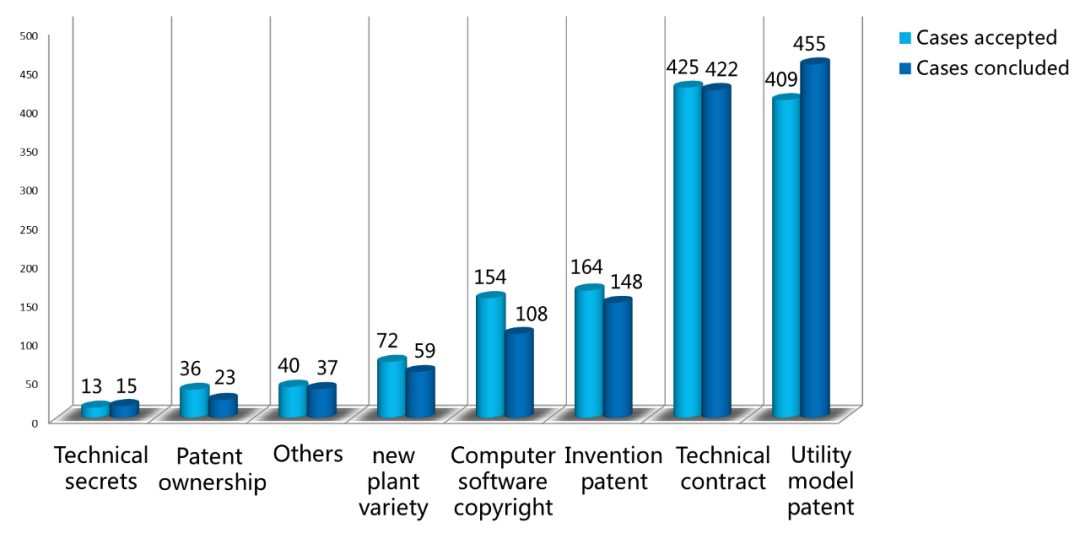
Fig. 4. Graph of first-instance technology-related civil cases accepted and concluded by Shandong courts in 2021
Shandong courts focused on strengthening the study on cutting-edge legal issues in new types of cases, and intensified protection of core technologies in new fields and new scenarios. The “router method invention patent case” heard by the Jinan Intellectual Property Tribunal was the first case where process patent was infringed in field of network communication in China, which was selected and listed in the No. 159 of the 28th group of Guiding Cases of the Supreme People’s Court. The determination of confidentiality measures in the “case of infringement of technical secrets for the gas transmission rate tester” heard thereby was promoted by the Supreme People’s Court under the 2020 technology-related adjudication rules. Clerical Errors in Claims Should be Determined Based on the Description, Drawings, and Common Knowledge in the Art compiled thereby was selected and listed in the “2021 Annual Cases of Chinese Courts.”
Shandong courts strengthened the protection of major agricultural scientific and technological achievements and new plant varieties with independent intellectual property rights, safeguarded the safety of China’s provenance and seed industry, and ensured the effective implementation of the national food security strategy and rural revitalization strategy. Over the year, a total of 72 new plant variety cases were newly accepted, up by 700% year-on-year, and 59 cases were concluded, up by 436% year-on-year, both of which hit record highs. The Jinan Intellectual Property Tribunal heard the “case of the dispute over the infringement of rights in new plant variety by the cucumber Derit 79”, through accurately complying with infringement identification standard of being close to the threshold value, transferring the burden of proof in a timely manner, and reducing the difficulty of proof by right holders of new plant varieties, this case was selected and listed in the “Typical Cases of Judicial Protection of Intellectual Property Rights in Seed Industry by the People’s Courts (second batch).”
2. Strengthening protection of commercial logos and serving the construction of a strong province with brands
Shandong courts resolutely prohibited trademark free-riding and counterfeiting, helped maintain the market value of well-known brands, gave full play to the brand effect of well-known brands integrating innovative elements and resources, and promoted the realization of the strategic goal of strengthening Shandong Province with brands. In 2021, a total of 7,763 first-instance civil cases of infringement of well-known brands both within and outside of Shandong Province and those within China and overseas, including Tsingtao Beer, Weichai, Changyu, Dong’e Ejiao, The Mixc, Yili, Mengniu, Nike, NBA, and others were newly accepted and 7,726 cases were concluded, up by 23% and 26% year-on-year respectively. In the “case of dispute over trademark infringement and unfair competition of Tencent”, the Shandong High People’s Court fully supported the right holder’s claim for compensation of RMB 20 million based on the evidence submitted by the right holder under the circumstance that the infringer refused to submit complete account books, thereby severely cracking down on the acts of counterfeiting trademarks and trade names in accordance with the law. This case was selected by the Supreme People’s Court and listed in the “50 Typical Intellectual Property Right Cases of Chinese Courts in 2020.” In the “case of dispute over trademark infringement and unfair competition of Heineken”, the Shandong High People’s Court changed the traditional thinking that administrative procedures are preferred or must be preceded, and ordered the infringer to stop the use of the design patent in accordance with the law if the design patent rights granted later infringed upon others’ prior trademark rights, thereby regulating abnormal patent applications through adjudication. This case was selected and listed in the “Top 10 Intellectual Property Adjudication Cases with the Most Research Value in China in 2020.”
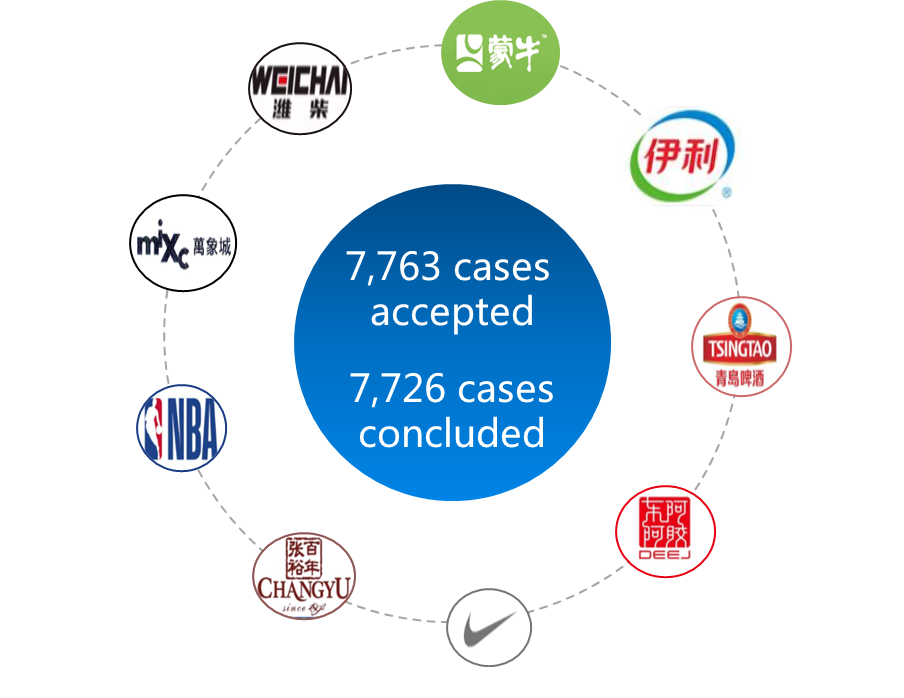
Fig. 5. Graph of civil first-instance trademark cases in Shandong courts in 2021
3. Strengthening copyright protection and helping build a culturally strong province
Shandong courts actively dealt with new issues of copyright protection related to digitization, networking, and intelligence, accurately grasped the judicial standards for copyright in the new technological environment, and supported the healthy development of the digital economy. In 2021, a total of 11,189 first-instance civil cases of copyright infringement were newly accepted by Shandong courts, and 10,786 were concluded, up by 11% and 7% year-on-year respectively. Among them, 5,882 cases involving the infringement of the right of information network dissemination were newly accepted and 5,840 were concluded; 3,311 cases involving the infringement of the rights of reproduction and distribution of works were newly accepted and 3,097 were concluded; 1,222 cases involving the infringement of the right of show were newly accepted and 1,170 were concluded; and 774 other cases were newly accepted and 679 were concluded. In the “case of dispute over Migu infringing upon the right of information network dissemination”, the Shandong High People’s Court affirmed the effectiveness of the evidence obtained from a third party electronic evidence service platform, which meets the requirements for obtaining evidence in civil litigation, thereby effectively reducing the burden of proof for the right holder, and providing a feasible path for new technology in the solution to the difficult problem of evidence collection and provision in juridical practice. Therefore, the case was selected and listed by the Supreme People’s Court as one of the “Top 10 Typical Cases Involving Internet”.

Fig. 6. Graph of civil first-instance copyright cases in Shandong courts in 2021
4. Regulating unfair competition and maintaining a fair competition order
Shandong courts fairly and efficiently tried various anti-unfair competition cases in accordance with the law, severely punished unfair competition such as compulsory “execution of exclusive dealing agreement” and “click farming and fraudulent credit speculation”, effectively protected the legitimate rights and interests of market players and consumers, and maintained and promoted fair competition in the market. In 2021, 891 first-instance civil cases of unfair competition were newly accepted by Shandong courts and 821 were concluded, up by 138% and 140% year-on-year respectively. Among them, 252 cases of disputes over trade names and packaging design were newly accepted and 215 were concluded; 155 cases of disputes over enterprise names were newly accepted and 128 were concluded; and 122 cases of disputes over counterfeiting were newly accepted and 81 were concluded. In the “unfair competition case of dispute over execution of exclusive dealing agreement of ele.me vs. Meituan”, the Qingdao Intellectual Property Tribunal strictly complied with the standards for determining platform-related monopoly and prohibited “execution of exclusive dealing agreement” to prevent disorderly expansion of capital and promote healthy and standardized development of the platform economy. In the “unfair competition case of dianping.com”, the Qingdao Intellectual Property Tribunal severely cracked down on unfair competition that disrupted economic order, such as “click farming and fraudulent credit speculation,” and effectively safeguarded fair, just, free, and honest competition among Internet platform merchants. These two cases were widely reported by the People’s Court Daily, China Intellectual Property News, and other media. In the “case of Tencent commercial defamation dispute”, the Shandong High People’s Court made a correct determination on whether the alleged infringer’s acts constituted commercial defamation by correctly grasping the essential elements of commercial defamation, which effectively promoted the standard and legal development of the Internet industry. The judgment document on this case was rated as the 4th “100 Excellent Judgment Documents” from nationwide courts.

Fig. 7. Graph of first-instance civil cases of unfair competition in Shandong courts in 2021
5. Strengthening equal protection and creating a “preferred place” for dispute resolution
Shandong courts closely focused on the overall development of the party and the country, insisted on the principle of equal protection, safeguarded the legitimate rights and interests of right holders and strove to create a good international business environment. In 2021, Shandong courts newly accepted 863 first-instance civil cases involving the intellectual property rights of foreign entities and the entitles in Hong Kong, Macao, and Taiwan and concluded 968 cases, accounting for 3.7% and 4.3% of total cases respectively. Among them, 477 cases involving foreign-related trademark rights were accepted and 527 were concluded, accounting for 55% and 54% respectively; and 363 cases involving foreign-related copyright were accepted and 415 were concluded, accounting for 42% and 43% respectively. In the cases of infringement of foreign trademarks, well-known international brands such as Chanel, Prada, Nike, Adidas, Levi’s, Louis Vuitton, and Hennessy as well as clothing, perfumes, alcohol, fertilizers, and other commodities were involved. In addition to safeguarding legitimate rights by foreign entities, the domestic entities, such as Gaoping Yaoyi Trading Co., Ltd., brought lawsuits against foreign entities such as NETGEAR for infringement of invention patents. In the “case of dispute over MicroEssentials trademark infringement and unfair competition”, based on the fact that the infringer had an all-round free-ride on the right holder’s business reputation to commit long-term infringement, the Shandong High People’s Court fully supported the right holder’s claim for compensation of RMB 10.3 million as the right holder had put in every effort to collect and produce evidence but the infringer refused to provide access to its account books, thereby effectively cracking down on infringement and comprehensively protecting the legal rights of the right holder. In the “case of dispute over Syngenta trademark infringement and unfair competition”, the Qingdao Intellectual Property Tribunal focused on strengthening the protection of the world-renowned and world-leading agricultural multinational group, and severely punished the source of infringement, thereby effectively safeguarding orderly market competition of the agricultural products.
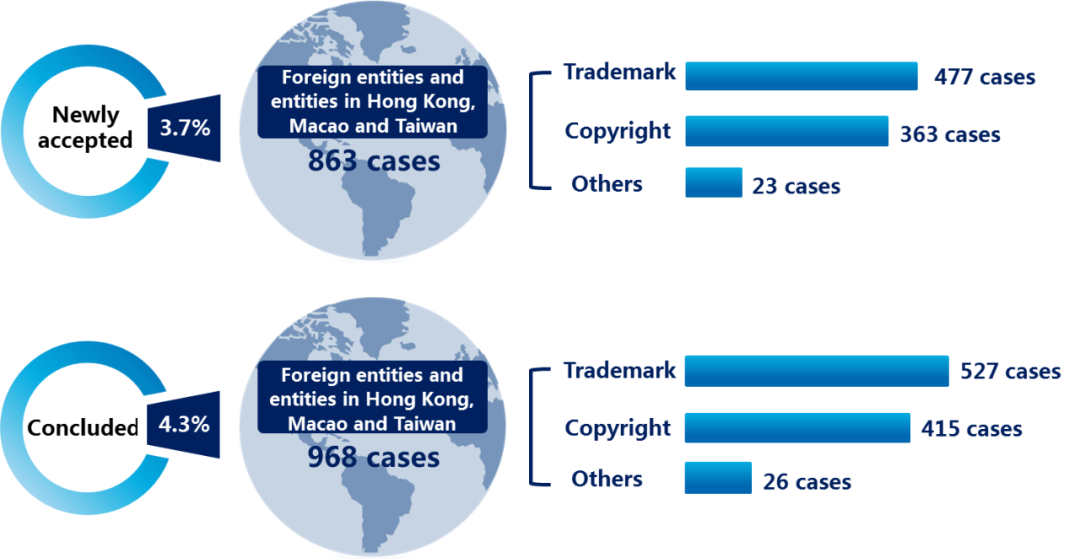
Fig. 8. Graph of first-instance civil cases of intellectual property rights involving foreign entities in Shandong courts in 2021
II. Improving the Overall Efficiency of Judicial Protection of Intellectual Property Rights and Striving to Create a Legal Environment Conducive to Innovation and Creativity
Based on actual intellectual property trials, Shandong courts strengthened coordination and cooperation with administrative functional departments, expanded diversified dispute resolution channels, strengthened judicial openness, consistently increased awarding of damages, and effectively improved the judicial ability to consistently and comprehensively optimize the business environment.
(I) Holding celebrations for the 20th anniversary to effectively enhance the influence of judicial protection
The year 2021 marks the 20th anniversary of the specialized trial of intellectual property rights in Shandong courts. Over the past 20 years, the number of intellectual property cases accepted by Shandong courts has increased dramatically, from 186 in 2001 to 23,555 in 2021; the field of protection has been continuously expanded, covering all types of cases, involving the creation, utilization, protection, management, and service of intellectual property rights; the jurisdiction layout has been gradually optimized, forming a layout of jurisdiction by the Shandong High People’s Court, the two intellectual property tribunals, other intermediate courts, and 21 local courts; the level of protection has been constantly improved, a total of 4 cases have been selected as the guiding cases of the Supreme People’s Court, 15 cases have been selected and listed in the Gazette of the Supreme People’s Court and Annual Report of the Supreme People’s Court on Intellectual Property Cases, and 40 cases have been selected and listed in the “Top 10 Intellectual Property Cases in Chinese Courts” and “50 Typical Cases” of the Supreme People’s Court. In 2021, Zhou Qiang, Secretary of the Party Leadership Group and President of the Supreme People’s Court, inspected the judicial work done in Shandong and fully affirmed the judicial protection of intellectual property rights by Shandong courts. He Rong, Deputy Secretary of the Party Leadership Group and Executive Vice President of the Supreme People’s Court, fully affirmed the judicial protection of intellectual property rights by Shandong courts and gave important instructions thereon. Xu Xianming, member of the Standing Committee of the National People’s Congress and Deputy Director of the Supervision and Judicial Committee of the National People’s Congress, led a research group to investigate the intellectual property trials in Shandong courts and spoke highly of the same.
To properly highlight the story of Shandong, create a novel “claim to fame” for Shandong, and drive the entire society to form a strong atmosphere of innovation and development, the Shandong High People’s Court launched a series of publicity celebrations to commemorate the 20th anniversary. The Shandong High People’s Court held a press conference to release the Chinese and English versions of the Intellectual Property Protection by Shandong Courts (2001-2021) and Selection of Typical Intellectual Property Cases in Shandong Courts(2001-2021), produced a promotional video themed on 20 Years of Youth - Shandong Intellectual Property Trials in Progress, selected outstanding judgment documents and outstanding research results on intellectual property rights, and rewarded advanced collectives and individuals in intellectual property trials. These activities were widely reported by the central and local mainstream media such as Xinhua News Agency and Dazhong Daily and achieved good results. Through these activities, the Shandong High People’s Court not only summarized the valuable experience in judicial protection of intellectual property rights in Shandong Province over the past 20 years, discovered problems, resolved shortcomings, and looked forward to the future, but also expanded the influence of judicial protection of intellectual property rights in Shandong Province, led social trends through judicial adjudication, and actively created a good atmosphere for respecting, studying, abiding by, and applying the law.
(II) Improving the protection linkage mechanism to strengthen the whole-chain protection of intellectual property rights
Shandong courts established and enhanced a standardized and institutionalized cooperation mechanism with market supervision, intellectual property, and cultural management authorities to enable cooperation in information sharing, problem discussion, and diversified dispute resolution, and to build a large-scale protection work pattern of judicial protection, administrative support, and social cooperation. The Shandong High People’s Court and Shandong Administration for Market Regulation held exchange forums on strengthening protection of intellectual property rights, and jointly signed and issued the Framework Agreement on Cooperation between Judicial Protection of Intellectual Property Rights and Administrative Law Enforcement. Jinan Intermediate People’s Court strengthened communication with public security, procuratorial, market supervision, and other authorities, and signed agreements with the Municipal Administration for Market Regulation and the provincial National Intellectual Property Protection Center to jointly punish intellectual property infringement. Qingdao Intermediate People’s Court and Municipal Administration for Market Regulation held a symposium on integrated judicial and administrative protection of intellectual property rights, to discuss a new model for the integrated judicial and administrative protection of intellectual property rights. Zaozhuang Intermediate People’s Court and Jining Intermediate People’s Court jointly formulated and signed the Framework Agreement on Judicial Protection of Intellectual Property Rights in Huaihai Economic Zone with the intermediate courts in 10 cities including Xuzhou and Huaibei, and they jointly released typical cases of judicial protection of intellectual property rights in Huaihai region. Weifang Intermediate People’s Court, Weifang Municipal Bureau of Justice, and Weifang Municipal Bureau of Culture and Tourism jointly issued the Measures for Implementation of “Three Mediations and One Litigation” for Copyright Disputes, realizing the complementarity of judicial and administrative advantages, and strived to achieve a full chain of copyright protection. Zibo, Yantai, Binzhou, and Dezhou Intermediate People’s Courts signed a collaborative protection agreement or established a linkage mechanism with the administrative agencies to jointly punish intellectual property infringement and form a joint force for intellectual property protection. The Decheng Primary People’s Court of Dezhou, and the Linqing Primary People’s Court of Liaocheng established a joint meeting system for intellectual property protection with the Procuratorate, Public Security Bureau, Justice Bureau, Administration for Market Regulation, and other relevant units at the district level to realize the collaborative progress of non-litigation dispute resolution, administrative law enforcement, and judicial protection of intellectual property rights.
(III) Improving diversified dispute resolution mechanisms to promote pre-litigation resolution of conflicts and disputes to the greatest extent
Shandong courts insisted on prioritizing the application of non-litigation dispute resolution mechanisms, improved the mediation linkage mechanism with relevant administrative authorities, people’s organizations, rights protection centers, industry associations, chambers of commerce, etc., and improved the connections between litigation and mediation, mediation and arbitration, administrative law enforcement and mediation, as well as the working system of multi-departmental consultation and cooperation, to resolve conflicts and disputes before entering the stage of litigation to the greatest extent. Qingdao Intellectual Property Tribunal gave special lectures to people’s mediators in various cross-jurisdiction regions, and utilized mediation to continuously improve the level of diversified cross-regional resolution of intellectual property disputes. Yantai Intermediate People’s Court and Municipal Administration for Market Regulation signed the Framework Agreement on the Integrated Administrative and Judicial Protection Mechanism of Intellectual Property Rights and established the Yantai Intellectual Property Dispute Mediation Center to improve the social and multi-channel intellectual property dispute resolution mechanism. Weifang Intermediate People’s Court and Weifang Arbitration Commission signed the Opinions on Further Improving the Quality and Efficiency of Arbitration Case Preservation, Enforcement and Judicial Review to promote the establishment of a comprehensive arbitration service window, strengthen the communication mechanism, and promote diversified dispute resolution. Weihai Intermediate People’s Court guided several mediators on the spot to conduct mediation, facilitated the conclusion of mediation agreements for 28 disputes, and provided professional training to all mediators on mediation skills and methods for intellectual property disputes. Binzhou Intermediate People’s Court and Municipal Administration for Market Regulation jointly issued the Implementation Opinions on Establishing a Litigation and Mediation Linkage Mechanism for Intellectual Property Disputes to promote the construction of a diversified resolution mechanism for intellectual property disputes, 720 cases were closed through mediation before litigation in 2021, accounting for 64% of the cases. Dezhou Intermediate People’s Court and Municipal Administration for Market Regulation signed the Implementation Opinions on Carrying out Litigation and Mediation Connection for Intellectual Property Disputes, and jointly established the “Litigation and Mediation Connection Studio for Intellectual Property Protection”. The Decheng Primary People’s Court of Dezhou integrated a professional IP trial team, a court rapid ruling and mediation center, a social IP rights protection association (professional IP mediation committee) into one platform, and specially invited mediators of the Ningjin County (Fitness Equipment and Furniture) Rapid Rights Protection Center and the Intellectual Property Mediation Center of the Dezhou Administration for Market Regulation to utilize the Mediation Platform of the Decheng Primary People’s Court, thereby quickly opening up a new avenue for mediation.
(IV) Strengthening judicial openness and promoting the normalization of judicial publicity in an orderly manner
Shandong courts have organized the publicity campaign of “4.26 World Intellectual Property Day” for 20 consecutive years. The Shandong High People’s Court held a press conference to release the Report on Intellectual Property Protection by Shandong Courts (2020) and Top 10 Intellectual Property Cases in Shandong Courts in 2020, and organized symposiums of NPC representatives to listen to their comments and suggestions on the intellectual property trials of Shandong courts. All intermediate people’s courts also held a press conference to release white papers on judicial protection. Representatives of Binzhou Intermediate People’s Court were invited as guests in the live broadcast of Morality and Rule of Law of Binzhou TV Station to expound on and share relevant intellectual property protection information with the general public, and played relevant short videos through the Intellectual Property Theater to explain intellectual property legal knowledge in a more casual and dynamic form, thereby improving public awareness of intellectual property protection. Liaocheng Intermediate People’s Court held an exhibition of infringing goods in the square of Liaocheng Citizen Cultural Activities Center, to improve the public’s ability to identify infringing goods.
(V) Implementing a system of punitive damages to effectively enable judicial punishment to act as a deterrent
In accordance with the requirements of the Shandong Provincial Party Committee and the Shandong Provincial People’s Government on the division of the key tasks of deepening reforms to “streamline the government, delegate power, and improve government services” so as to optimize the business environment in Shandong Province, the Intellectual Property Division of the Shandong High People’s Court, along with the Shandong Intellectual Property Research Institute and the Law School of Yantai University, studied and discussed problems related to punitive damages for infringement of intellectual property rights. They prepared the Research Report on the System of Punitive Damages for Infringement of Intellectual Property Rights based on extensive survey, developed Guidelines of Shandong High People’s Court for Judgment on the Application of Punitive Damages in the Trial of Civil Cases of Intellectual Property Infringement to refine the standards for punitive damages for infringement of intellectual property rights and put the system of punitive damages into practice, and successfully completed the key task of optimizing the business environment keeping in mind division of labor. In the Report on Evaluation of Business Environment by 10,000 Private Enterprises, Shandong Province ranked first in China in the judicial indicator score, thanks in a large part to judicial protection of intellectual property rights in Shandong Province. To accurately apply the system of punitive damages for intellectual property rights and punish infringements of intellectual property rights in accordance with the law, Zibo Intermediate People’s Court formulated the Guiding Opinions on the Application of Punitive Damages in Civil Cases of Intellectual Property Infringement, Dongying Intermediate People’s Court formulated the Opinions on Promoting the Application of Punitive Damages in Civil Cases of Disputes over Intellectual Property Infringement, Rizhao Intermediate People’s Court formulated the Judgment Rules on the Application of Punitive Damages in Civil Cases of Disputes over Intellectual Property Infringement, and Binzhou Intermediate People’s Court formulated the Opinions on the Application of Punitive Damages in Civil Cases of Disputes over Intellectual Property Infringement (Trial).
(VI) Deepening judicial exchanges and cooperation to form a good image of judicial protection
The Shandong High People’s Court was invited to participate in the 2nd Qingdao Summit for Leaders of Multinational Corporations and gave a detailed introduction on the “status of judicial protection of intellectual property rights in Shandong Province” at the forum on intellectual property protection and cooperation of transnational corporations, held a symposium on the application of “anti-suit injunction” in intellectual property infringement cases with the Shandong Law Society and Shandong University School of Law, and had an informal discussion with the China Audio-Video Copyright Association in respect of KTV operators’ infringement and compensation. Qingdao Intermediate People’s Court and Qingdao Lawyers Association jointly held seminars on cutting-edge issues, participated in academic activities such as the seminar on the “Guidelines for Enterprise Intellectual Property Compliance under the RCEP Agreement” in the Free Trade Zone, and the “4.26 Qingdao Intellectual Property Forum,” and their representatives delivered keynote speeches to enhance the brand influence of “Qingzhi.” The representatives of Weifang Intermediate People’s Court were invited to give a lecture on the “Citywide Intellectual Property Protection and Dispute Mediation Capability Improvement Training Course” held by the Municipal Administration for Market Regulation and Municipal Intellectual Property Protection Center, to provide targeted guidance on difficult and complex issues in administrative law enforcement practice. Weihai Intermediate People’s Court participated in the annual work meeting of the Weihai Intellectual Property People’s Mediation Committee and the Weihai Intellectual Property Litigation, Mediation, Litigation and Adjudication Connection and Coordination Meeting, where its representatives provided professional guidance to people’s mediators on mediation.
III. Deepening Reform and Innovation in the Field of Intellectual Property Trial and Promoting Modernization of the Intellectual Property Trial System and its Capacity
Shandong courts strengthened the trial levels and functional orientations of courts structured in a four-tier system, deepened the reform on the intellectual property trial system and mechanism, improved various working mechanisms, and constantly improved judicial capacity to deepen reform and innovation.
(1) Continuing to promote “three-in-one” mechanism reform
The Shandong High People’s Court and the People’s Procuratorate of Shandong Province held several symposiums on the “three-in-one” trial of intellectual property cases, and jointly signed and issued the Framework Agreement on Cooperation between Intellectual Property Trial and Procuratorial Functions, to work together in promoting the “three-in-one” trial of intellectual property cases. The Shandong High People’s Court formulated the Implementation Plan for Comprehensively Promoting the “Three-in-One” Trial of Intellectual Property Cases and issued it across the province for implementation, comprehensively promoting the orderly development of the “three-in-one” trial of intellectual property cases by Shandong courts. At present, Shandong High People’s Court, 17 intermediate people’s courts in the province, and 21 grassroots courts including Lixia Primary People’s Court of Jinan have all carried out the “three-in-one” trial of intellectual property cases, and the intellectual property judicial protection system and mechanisms of Shandong courts have been further improved. Qingdao Intermediate People’s Court and the People’s Procuratorate of Qingdao jointly convened a “three-in-one” work promotion meeting on intellectual property and signed the Framework Agreement on Cooperation between Intellectual Property Trial and Procuratorial Functions, to establish and improve the case jurisdiction system and coordination mechanism. Yantai, Binzhou, Dezhou, and Liaocheng Intermediate People’s Courts jointly issued or countersigned cooperation framework agreements and other documents with local procuratorial organs and public security organs, to comprehensively strengthen coordination and cooperation in the crackdown on crimes against intellectual property rights and further enhance judicial protection of intellectual property rights. Yantai, Weihai, and Liaocheng Intermediate People’s Courts also issued specific implementation plans, notices on adjustment of jurisdiction and other documents to promote the implementation of the “three-in-one” trial of intellectual property cases. In 2021, Shandong courts newly accepted 24 administrative cases of first-instance, up by 50% year-on-year, and closed 17 cases; and newly accepted 256 intellectual property criminal cases of first-instance and closed 232 cases. In the “technical secret infringement case of Qingdao Yunlu Company”, Qingdao Intellectual Property Tribunal awarded a civil compensation of RMB 5 million in addition to criminal sanctions, bringing down the hammer on the infringement, while highlighting the beneficial role of the “three-in-one” mechanism for intellectual property trial in rights protection.
(II) Strengthening the development of intellectual property tribunals
Since the establishment of Jinan and Qingdao Intellectual Property Tribunals in 2017, the Shandong High People’s Court has continued to strengthen the development of the two tribunals. In March 2021, the Shandong High People’s Court held a special forum on the Jinan and Qingdao Intellectual Property Tribunals, and made arrangements for further strengthening the development of the two tribunals under six aspects such as improving the political position and remaining broad-minded, serving the overall interests and encouraging and guaranteeing innovation, improving the layout and innovating the system and mechanism, building brands and implementing high-quality strategies, intensifying compensation and implementing the strictest protection, and cultivating talents and building a first-class team. The two tribunals actively promoted the establishment of a cross-regional intellectual property judicial cooperation mechanism, and signed work agreements with relevant intermediate people’s courts within their respective jurisdictions to establish a collaboration platform. Jinan Intellectual Property Tribunal established Zibo, Liaocheng, and Jinan Free Trade Zone Circuit Courts in addition to the original three circuit courts in Heze, Shizhong District of Jinan, and Changqing, and Qingdao Intellectual Property Tribunal realized the full coverage of circuit courts under the technology-related IP cases jurisdiction, thereby further optimizing the technology-related IP trial system. The two tribunals had a significant effect on leading intellectual property trials in Shandong Province. In 2021, Jinan Intellectual Property Tribunal newly accepted 1,902 intellectual property cases and concluded 1,946 cases; among them, 1,423 cross-regional intellectual property civil cases of first-instance were accepted and 1,285 were concluded. Qingdao Intellectual Property Tribunal newly accepted 1,696 intellectual property cases and concluded 1,497 cases; among them, 858 cross-regional intellectual property civil cases of first-instance were accepted and 757 were concluded. Due to the outstanding achievements of the two tribunals, the Shandong High People’s Court gave a statement introducing the relevant experience of the two tribunals at the Symposium on the Scientific and Technological Innovation in Service Guarantee of Intellectual Property Trial by National Courts held this year.
(III) Improving the technical fact-ascertaining mechanism
Shandong courts established a technical fact-ascertaining mechanism for technical investigators, technical consulting experts, technical appraisers, and expert assistants to participate in litigation activities, effectively improving the level of ascertaining technical facts in intellectual property disputes. Jinan Intermediate People’s Court issued the Implementation Rules for the Management of Technical Investigators (Trial), established a technical expert database, and engaged 24 technical experts as technical investigators for intellectual property trials based on the engagement of 38 nationally renowned experts as consulting experts, to build a technical investigator operating mechanism with Jinan characteristics. Based on the selection and engagement of 40 technical consulting experts and 22 part-time technical investigators, Qingdao Intermediate People’s Court requested the People’s Congress to appoint 35 technical experts to serve as jurors to participate in court trials, on-site investigations, and other litigation activities, and to assist judges in accurately understanding and efficiently ascertaining the professional and technical issues of the case, to maximize the role of experts in ascertaining technical facts. Professor Guo Yinjing from Shandong University of Science and Technology participated in the “utility model patent infringement case of mobile phone diaphragm” heard by Qingdao Intellectual Property Tribunal as a member of the collegial panel, which was widely reported by major media.
(IV) Improving the separate litigation mechanism for complex and simple cases
Shandong courts comprehensively strengthened the governance of litigation sources and explored a rapid trial mechanism for intellectual property cases. Jinan Intellectual Property Tribunal’s quick adjudication team accepted 1,005 cases and concluded 1,009 cases, accounting for 53% and 52% of the total number of intellectual property cases in the same period respectively. The Lixia Primary People’s Court of Jinan applied the small claims procedure for intellectual property cases and the element-based trial mode for copyright and trademark disputes and concluded 654 intellectual property cases by applying the small claims procedure. Weihai Intermediate People’s Court and Huancui Primary People’s Court set up two quick adjudication teams respectively, reducing the average case handling period to about half of that in 2020 while the number of intellectual property civil cases accepted in 2021 nearly doubled on a year-on-year basis.
(V) Strengthening the application of smart court results
Shandong courts made full use of the successful development of smart courts and relied on the full-process case handling system to achieve seamless connection of online case filing, electronic service of judicial documents, and timely ruling, thereby shortening the internal circulation cycle. The Shandong High People’s Court vigorously promoted court trials on the Internet; among the 431 cases heard in court (investigated), 325 were heard over the Internet, accounting for 75%. Shandong courts took the lead in realizing the electronic transfer of appeals to the Supreme People’s Court for technology-related intellectual property cases. Relying on the smart court platform, Jinan Intellectual Property Tribunal actively implemented the whole-process online handling of cases, thereby realizing online hearing of 114 cases via the Internet and electronic service 4,523 times during the whole year. The courts under the jurisdiction of Jining Intermediate People’s Court heard 340 cases online, with an online hearing rate of 33%. Rizhao Intermediate People’s Court heard 40 cases online, mediated 161 cases through audio and video, telephone and WeChat, and realized electronic service 294 times. Qingdao Intellectual Property Tribunal took the lead in building an “intelligent 3D evidence management system” and applying 3D scanning and modeling technology and blockchain technology to model physical evidence in 3D through 3D scanning boxes, handheld scanners, space scanners, drones, etc., to create a high-definition three-dimensional display model. The system is the first in China to achieve seamless connection of digital evidence with the case handling system of the Supreme People’s Court, through which judges and parties concerned can directly view the details of evidence from multiple angles and from all directions through electronic devices, thereby effectively solving problems related to evidence storage and transfer. This system was specially reported on the front page of the People’s Court Daily and on the official WeChat account “Building A Smart Court” of the Supreme People’s Court. Jinan Intellectual Property Tribunal actively explored and implemented the “Intelligent 3D Evidence Management Model,” built 461 “Intelligent 3D Evidence” models throughout the year and issued the “Intellectual 3D Evidence” Management Specification for Intellectual Property Trials (Trial), to comprehensively promote the in-depth integration of information technology and intellectual property trial. The above experience and practices were publicized and reported by Xinhuanet. Now the Shandong High People’s Court is heavily promoting the in-depth integration of information technology and intellectual property trials throughout the province, and several courts have gradually started relevant work.
IV. Intensifying the Guidance on Research of Intellectual Property Trials and Actively Serving the Overall High-Quality Economic and Social Development
Shandong courts strengthened research on hot and difficult issues in trials, strengthened supervision and guidance through various means, strengthened guidelines for adjudication rules, and constantly improved the judicial ability to serve the overall work situation.
(I) Strengthening trial guidance and unifying adjudication standards
At the beginning of the year, the Shandong High People’s Court formulated and issued the Key Points of Intellectual Property Trial in 2021 to make overall arrangements for the work throughout the year; completed the Analysis Report on the Remand and Amendment of the Second-instance Intellectual Property Cases and Typical Cases of Shandong Courts in 2020, summarizing and analyzing the problems in the trial of the first-instance cases by Shandong courts and defining relevant adjudication rules; unified the adjudication standards on related issues such as the seller’s infringement compensation amount, infringement compensation made by the KTV operator in Shandong Province, and the jurisdiction of intellectual property cases; and promptly pushed the experience, practices and typical cases of intellectual property judicial protection through the quarterly magazine Summary of Intellectual Property Trial and the WeChat group of intellectual property judges in Shandong Province, thereby constantly expanding the channels for trial guidance. To promote and amplify the practicability of “three-in-one” trial of intellectual property cases, the Shandong High People’s Court completed the Research Report of Shandong Courts on the Application of Laws in Criminal Cases of Intellectual Property Rights and completed the provincial social science research project Research on the Application of Laws concerning Punitive Damages for Intellectual Property Rights. Dongying Intermediate People’s Court conducted a survey and research on the protection of geographical indication certification trademarks and prepared a research report as a judicial service to further improve the market visibility of local specialties.
(II) Formulating normative opinions to accurately serve the overall interests
Strictly in accordance with the major deployments of the provincial capital such as construction of a new and old kinetic energy conversion starting zone and a free trade pilot zone, Jinan Intermediate People’s Court formulated the Opinions on Comprehensively Strengthening Judicial Protection of Intellectual Property Rights to Promote Innovation and Development, actively extended the judicial protection function of intellectual property rights, and made every effort to serve and safeguard the innovative development of economy and society. Binzhou Intermediate People’s Court issued the Implementation Opinions on Strengthening Judicial Protection of Intellectual Property Rights and Promoting the Construction of a Legalized Business Environment, to protect intellectual property rights with more energy and improve the public awareness of intellectual property protection. Dezhou Intermediate People’s Court formulated the Opinions on Giving Full Play to Judicial Functions to Protect and Promote Scientific and Technological Innovation in accordance with the Law, which was affirmed and highly appraised by the leaders of the Dezhou Municipal Committee of the Communist Party of China.
(III) Extending judicial services to ensure innovative development
The Shandong High People’s Court proposed suggestions and comments on several deployment documents of the CPC Shandong Provincial Committee such as the 2021-2022 Intellectual Property Protection Promotion Plan of Shandong Province and Intellectual Property Promotion and Protection Regulations of Shandong Province, submitted the statistics on intellectual property rights judicial cases of Shandong courts to the provincial Administration for Market Regulation, and submitted the Work Summary of Shandong Courts on the Crackdown on Intellectual Property Infringement and Manufacture and Sale of Fake and Shoddy Commodities in 2021 to the Shandong Intellectual Property Administration, thereby contributing judicial wisdom to the promotion of high-quality development in Shandong. In addition, the Shandong High People’s Court proposed suggestions for amending the draft for comments of several judicial interpretations such as the Interpretation by the Supreme People’s Court of Several Issues Concerning the Application of the Anti-Unfair Competition Law of the People’s Republic of China. Jinan Intellectual Property Tribunal held the “Intellectual Property Lecture Hall” to provide free online training for the public. In cooperation with the Qingdao Civil Economic Development Bureau, Qingdao Intermediate People’s Court held online seminars such as “Serving the Intellectual Property Protection of Private SMEs” and “Service Month for SMEs - I Do Practical Things for Enterprises - Intellectual Property Empowers Enterprise Development” cumulatively attracting more than 15,000 viewers online and offline, and cooperated with Shandong University School of Law to carry out the “Accessible Laws” - Court Trial of Intellectual Property Cases on Campus activity. With the help of the convenient grid platform and the technology court office system, Zibo Intermediate People’s Court set up an intellectual property trial office in the enterprise park. Yantai Intermediate People’s Court conducted lectures for the students of the Law School of Yantai University, and served as a reviewer for the students’ postgraduate thesis oral defense.
V. Always Adhering to the Correct Direction of Intellectual Property Trial and Striving to Build a Professional High-Quality Trial Team
Shandong courts promoted comprehensive and practical rectification of study and education of party history and team education and strove to build a judicial trial team for intellectual property cases with resolute political stance, holistic and international view, profound legal knowledge and sophisticated skills.
(I) Adhering to the leadership of party building and strengthening political construction
Shandong courts focused on promoting trials through team building under the leadership of party building, strengthened political construction, and built political loyalty. Shandong courts comprehensively studied and implemented the spirit of General Secretary Xi Jinping’s “July 1” Speech and the spirit of the Sixth Plenary Session of the 19th Central Committee of the Communist Party of China to constantly improve the political position and adhere to ideals and beliefs. The Shandong courts were always subject to the Party’s absolute leadership over judicial work, unswervingly marched forward on the path of socialist rule of law with Chinese characteristics, deeply understood the decisive significance of the “two establishments”, strengthened the “Four Consciousnesses”, strengthened the “Four Matters of Confidence”, and achieved the “Two Upholds”. The Shandong High People’s Court, together with the Shandong University School of Law and the Party Branch of the Research Department of the Shandong Law Society, carried out party day activities on the theme of party history learning, promoted the in-depth integration of party building and trial, and achieved good results in promoting trials through team building under the leadership of party building. Furthermore, they carried out party day activities themed on “building loyalty and setting good examples”, established overall awareness and collective spirit, and formed a collective atmosphere that resolutely opposed “two-faced people” and “self-deprecation.” Qingdao Intermediate People’s Court carried out activities such as “Party Day Themed on Academician Park” and “Party Day Themed on Celebrating the Motherland’s Birthday and the Fourth Anniversary of the Court’s Establishment” to stimulate all the judges, court staff, and judicial personnel to stand firm in their ideals and principles by studying a century of party history and enhance party spirit accomplishment.
(II) Strengthening study and education to build a team with rich experience in politics and law
Shandong courts solidly carried out study and education of party history and education and rectification of political and legal team, and effectively took the study and education of party history as an integral practice of the “Two Upholds” to constantly improve the political position and stand firm in support of their ideals and principles. The Shandong High People’s Court organized all the judges, court staff, and judicial personnel to participate in the story meeting themed on “Saluting the Heroines, and Inheriting the Red Gene”, the meeting of experience sharing in the study of the party history, and the “Mission Calls for Responsibility” party spirit education, learning and training activities to improve the efficiency in study and education of party history and party spirit accomplishment. Shandong courts actively carried out the activity themed on “I do practical things for the masses”, and the Shandong High People’s Court visited Rongchang Pharmaceuticals, Ltd. and Wanhua Chemical Group Co., Ltd. to hold discussions and exchanges on the problems these two companies encountered in intellectual property protection. Jinan, Yantai, Weihai, Tai’an, Liaocheng, and Heze Intermediate People’s Courts actively popularized laws to enterprises and provided “zero-distance” legal services enabling enterprises to boost enterprise innovation and development, thereby effectively solving the urgent and difficult problems and the anxiety faced by the people. Qingdao Intermediate People’s Court strengthened the professional construction of the trial team and the young cadre team, established the “Intellectual Property Innovation Service Team”, and actively built a national professional brand in the field of intellectual property trials.
The year 2022 is not only an important year for China to enter a new journey of building a modern socialist country in an all-round way and marching toward the second centenary goal, but also a decisive year for Shandong to “achieve a breakthrough within five years” in converting old and new kinetic energy. Shandong courts will continue to closely unite around the CPC Central Committee with Comrade Xi Jinping as the core, guided by Xi Jinping Thought on Socialism with Chinese Characteristics for a New Era, conscientiously implement the spirit of the Symposium on the Scientific and Technological Innovation in Service Guarantee of Intellectual Property Trial by National Courts, fully implement the key tasks of the “Ten Innovations” proposed at the 2022 Work Mobilization Conference of Shandong Province, strictly prioritize innovation at the core of the overall development, further intensify the judicial protection of intellectual property rights, and strive to provide more powerful judicial services and guarantees for the construction of a strong and modern socialist province in the new era to usher in the 20th National Congress of the Communist Party of China with outstanding achievements.
The Shandong High People’s Court
April 21, 2022
(图片来源 | 网络)



















